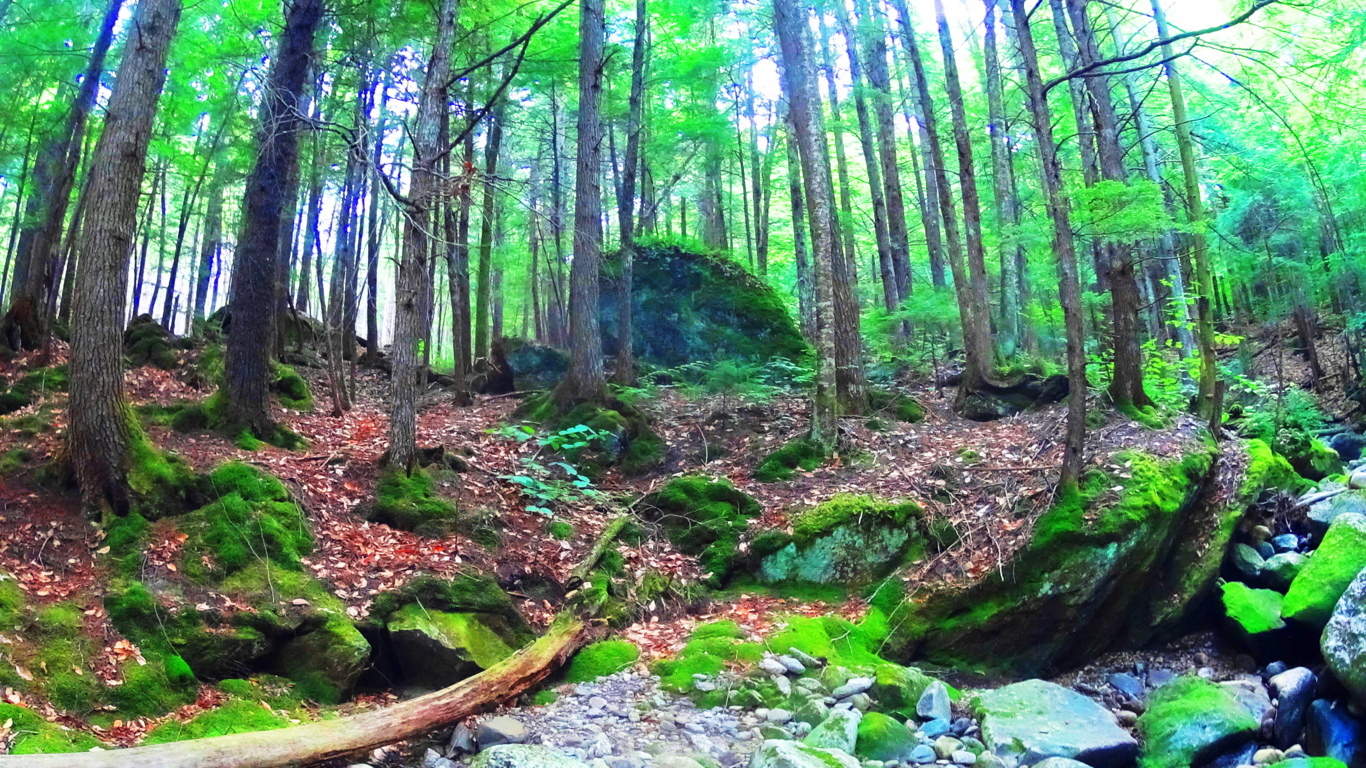Mount Moosilauke
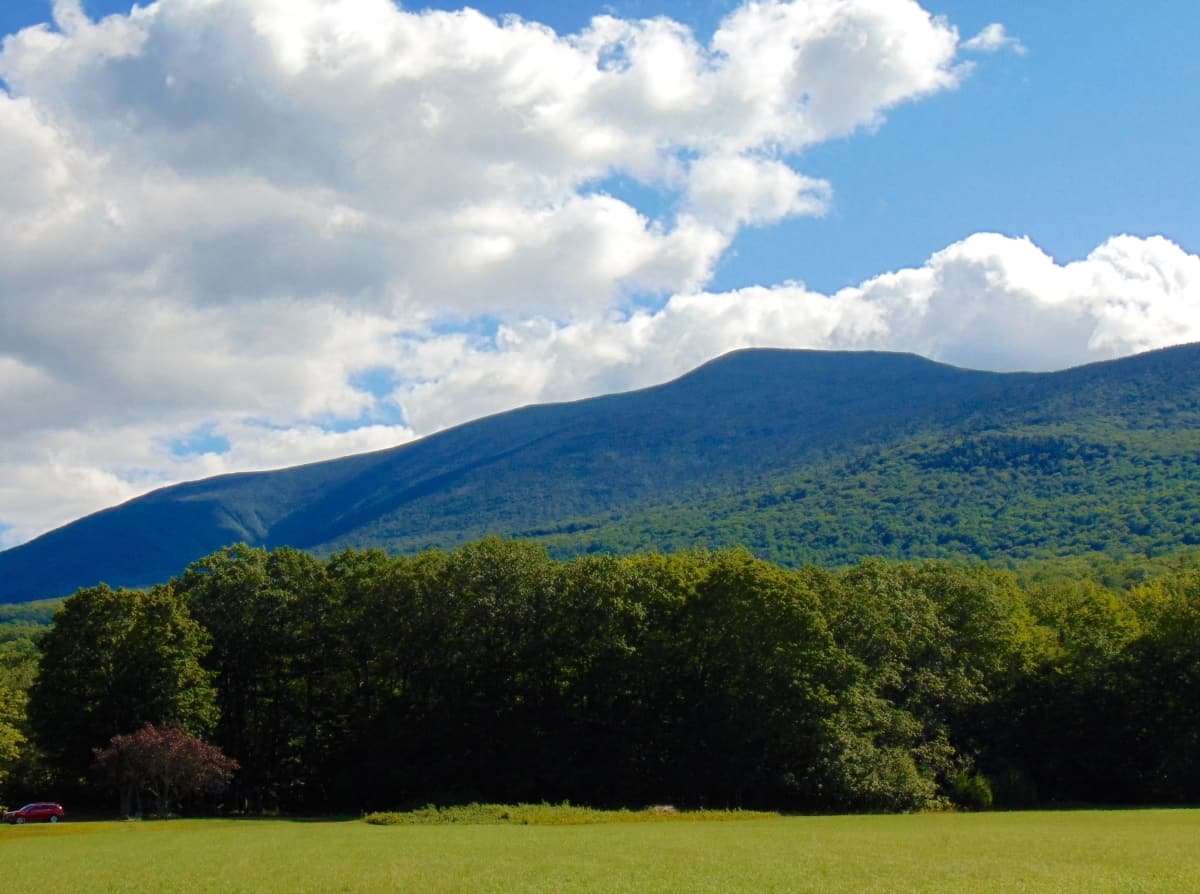
Elevation: 4,805 ft.
Location: The White Mountains/Benton, New Hampshire/USA
Introduction: Welcome to the dramatic western edge of The White Mountain Range, in New Hampshire/USA!
Mount Moosilauke (Moos-ih-lahk-ee) retains a title given by the Abenaki Native American Tribe; It means: “Rocky face above the trees”. As we will see, the high place at the top of this Mountain, is a definitive and distinct megalithic spiritual zone, where the enchanted stones of the peak mingle intimately with the clouds.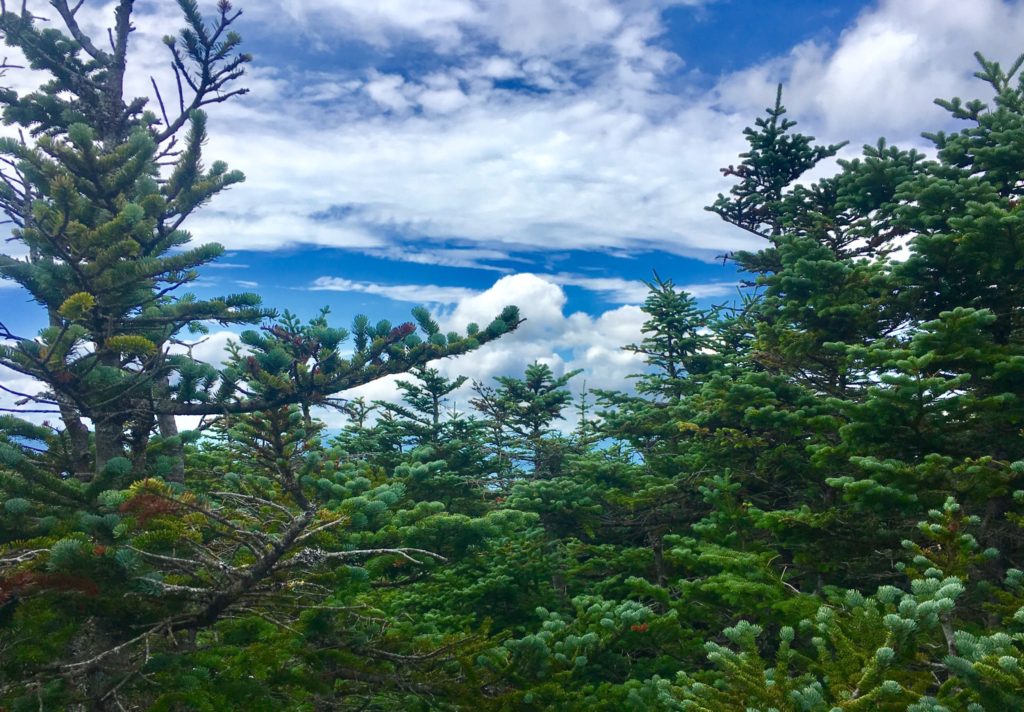
This unique title given by the Abenaki, also indicates a deeper meaning, beyond the name itself. Almost every one of the many White Mountain Peaks has a ‘rocky face above the trees’. Mount Washington, Mount Chocorua, Mount Adams, and Mount Jefferson, all have a ‘rocky face above the trees’. Why single out Mount Moosilauke? There is something special going on here.
I believe that The Abenaki were acknowledging this particular ‘rocky-face’ due to the many unique features that they encountered, and considered spiritually significant when they first saw it. In our time, we see them as Neolithic anthropological features, so ancient, that it seems clear to me that they were there before the Abenaki people had arrived. I can support this with evidence. Let’s take a look at the multi-layered experience of megalithic evidence during this phenomenal climb at Mount Moosilauke.
A Note About ‘Culture’: The ancient stone works found at Mount Moosilauke pre-date the Native American Tribes of New England. The Neolithic Culture you are about to experience on Mount Moosilauke, through this article, created monumental works of stone, in extremely difficult locations, and ways, all of which existed long before any Native American tribes had arrived.
This Megalithic Culture has specific memes (symbols), fixtures (arrangements of stone), and structures (functional centers, small temples,) in the highest elevations all over the world, that mirror, and mimic directly with European Megalithic memes, fixtures, and structures, entire continents away. This would support the idea of a single Megalithic Culture, with a single, common, source of systems. Not hundreds of individual, nomadic, Native America Tribes; Each with its own traditions, with basic tools, and migrations that moved seasonally in the valleys, planting crops, hunting, and fishing game.
I understand that this is very hard for many local researchers to accept, defending the idea that Native Americans created these Neolithic statements; but the evidence and cultural history clearly, and definitively, indicate otherwise. Of course, that statement must be supported with the evidence. So here is yet more evidence, and common Megalithic memes, and structures, from Mount Moosilauke, in New Hampshire, that relate directly to Mountains in Ireland, Arizona, Maine, and other sacred locations and high elevations, thousands of miles away; All these locations crafted in challenging, sophisticated, Megalithic stone.
Ancient Megalithic Memes in New England: Walking along the forest streams of the Franconia Notch Range, some 6 miles west of Mount Moosliauke, just a day before my intense climb, I came upon a six foot tall, equilateral-triangular standing stone, set perfectly in the midst of a quiet stream near Route 3. 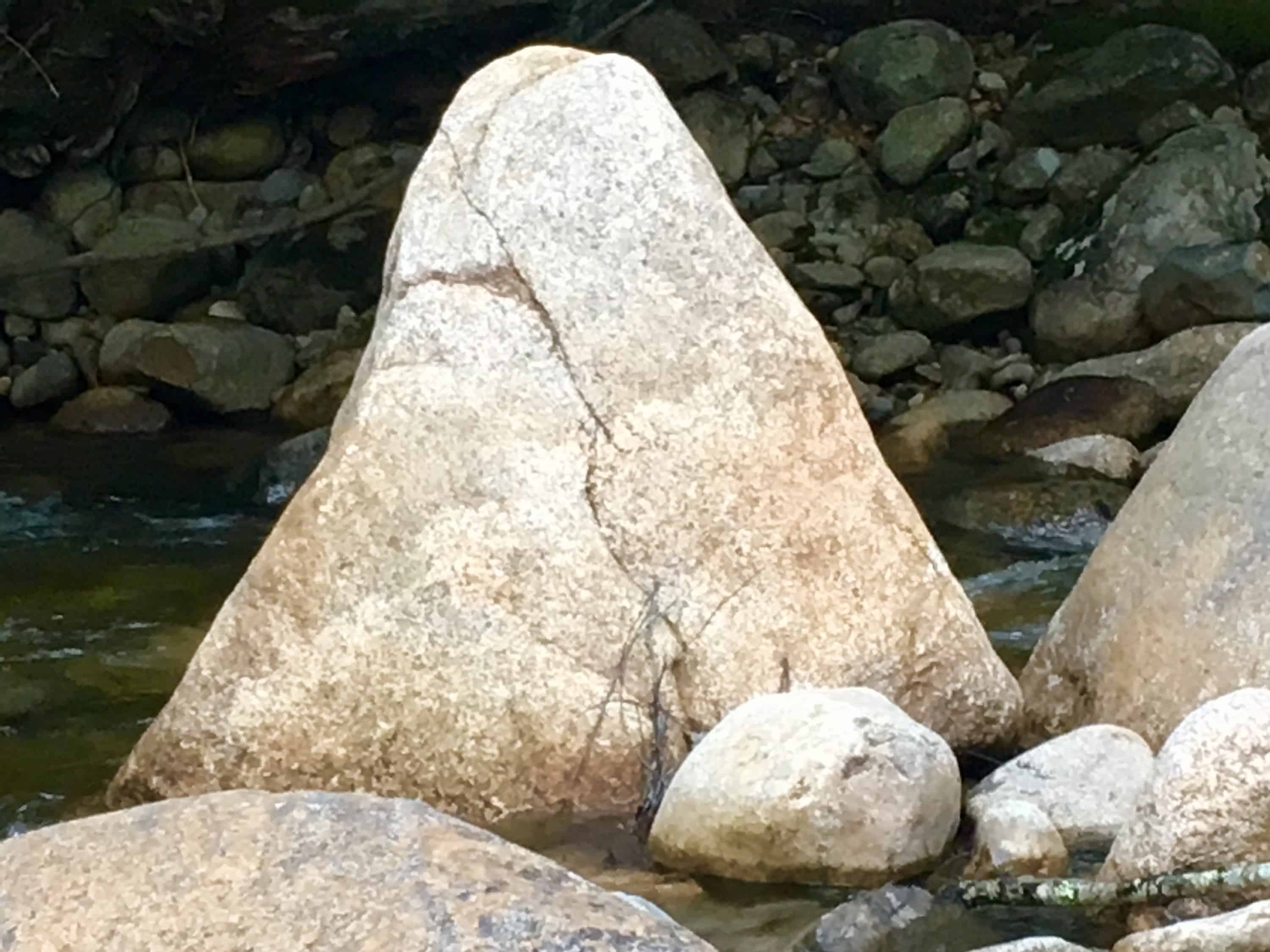
The meme of Megalithic-stone-equilateral-triangles in the Forests of New England, from Massachusetts to Maine, and everywhere in between, is one of the most prevalent and abundant symbols/memes that can be found. On this website alone, there are compiled, and permanently documented, several dozen equilateral triangle memes cut in massive stone in the wilderness.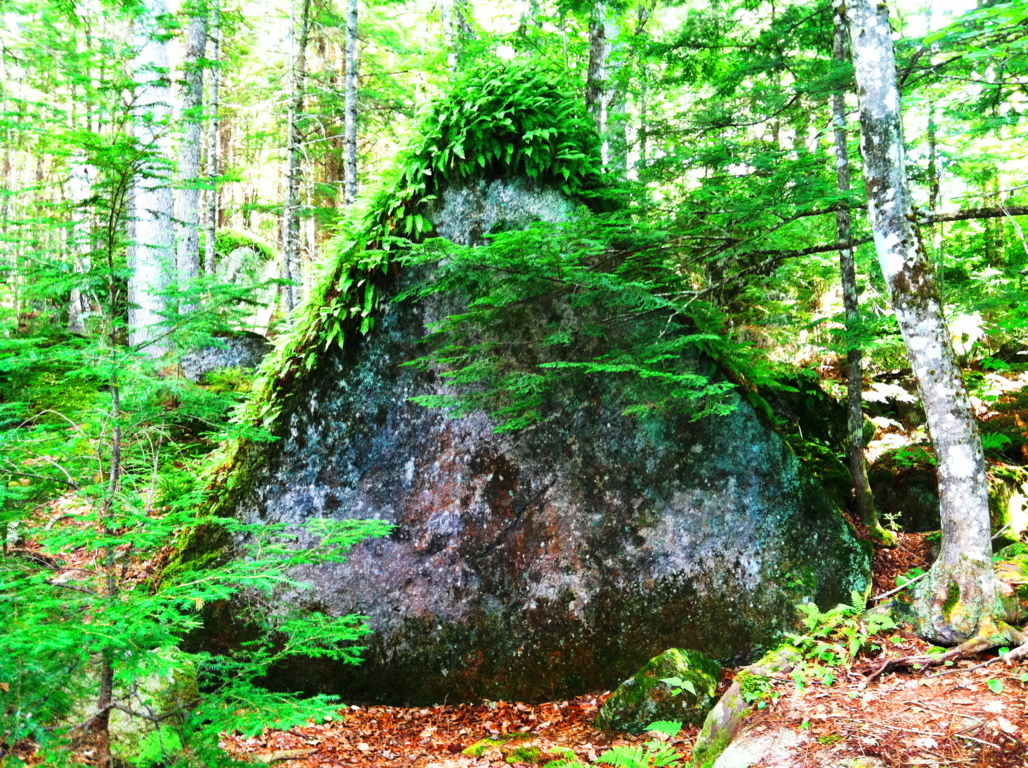
These stones have significant ‘directionality’, and meaning, yet to be fully understood, or even acknowledge by current anthropology. Academics want us to believe a glacier created these statements? I’m sorry to be blunt here, but how intensely-stupid do these current Post-modern anthropologists think we are? Not to mention the fact that I have NEVER ONCE encountered, in any of the mountain ranges I have climbed, in the entire Western Hemisphere, a single real-time Anthropologist, or Professor, in a DECADE.
Very soon, these arm-chair-anthropologists, that dispute the Megalithic memes, are going to be absolutely disproven, and in the most blatant scientific way possible. With EVIDENCE. The evidence is mounting, and couldn’t be any clearer, that these are intentionally crafted, Megalithic, Neolithic-Period works. So, lets take a look at some examples: 
The green equilateral triangle stone pictured in the above image, has a perfectly cut, flat face, standing ten feet high. It might weigh 100 tons. I said 100 tons! It LOOKS LIKE AN ANNOUNCEMENT! BEGGING TO BE NOTICED! THEY ALL DO! It is located in the immense Forest surrounding the sacred Mount Katahdin, in Maine.
The perfectly equilateral stone pictured to the right, is located in a beautiful Forest in Upton Massachusetts. This example is relatively small compared to many of the other statements, at about 3 feet, on each side. It is absolutely set to a stone below it. You could not budge this stone with all your strength. The point is, someone crafted it, fixed into the rock-face below, perfectly, with a tool capable of doing so, cut directly out of the rock. Look at it. It’s perfect.
To add to this Neolithic context, not far from this very spot, is a megalithic chamber, designed in the the exact same internal, structural-fashion, as the Megalithic Chamber at New Grange. An inside (and outside) that most sacred Megalithic chamber at New Grange is….yes, you guessed it, dancing equilateral triangles, cut into the stones.
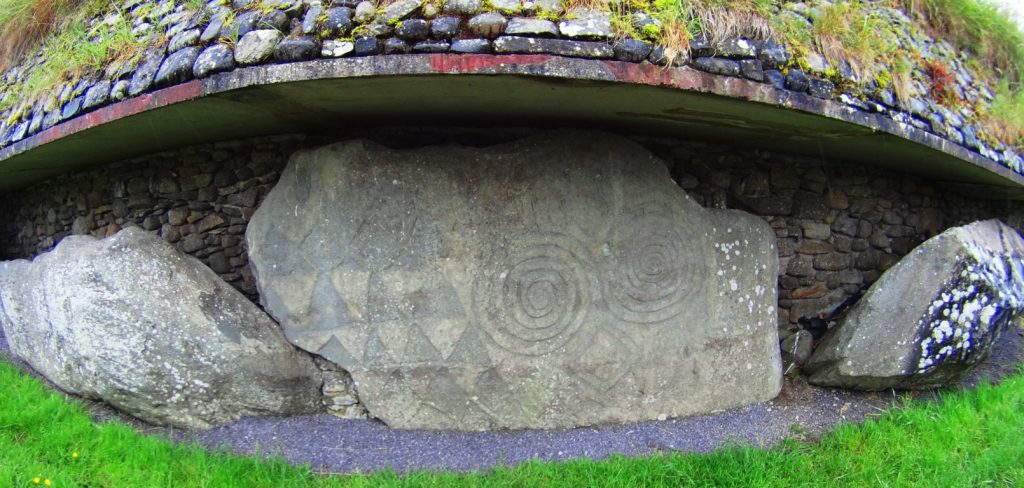
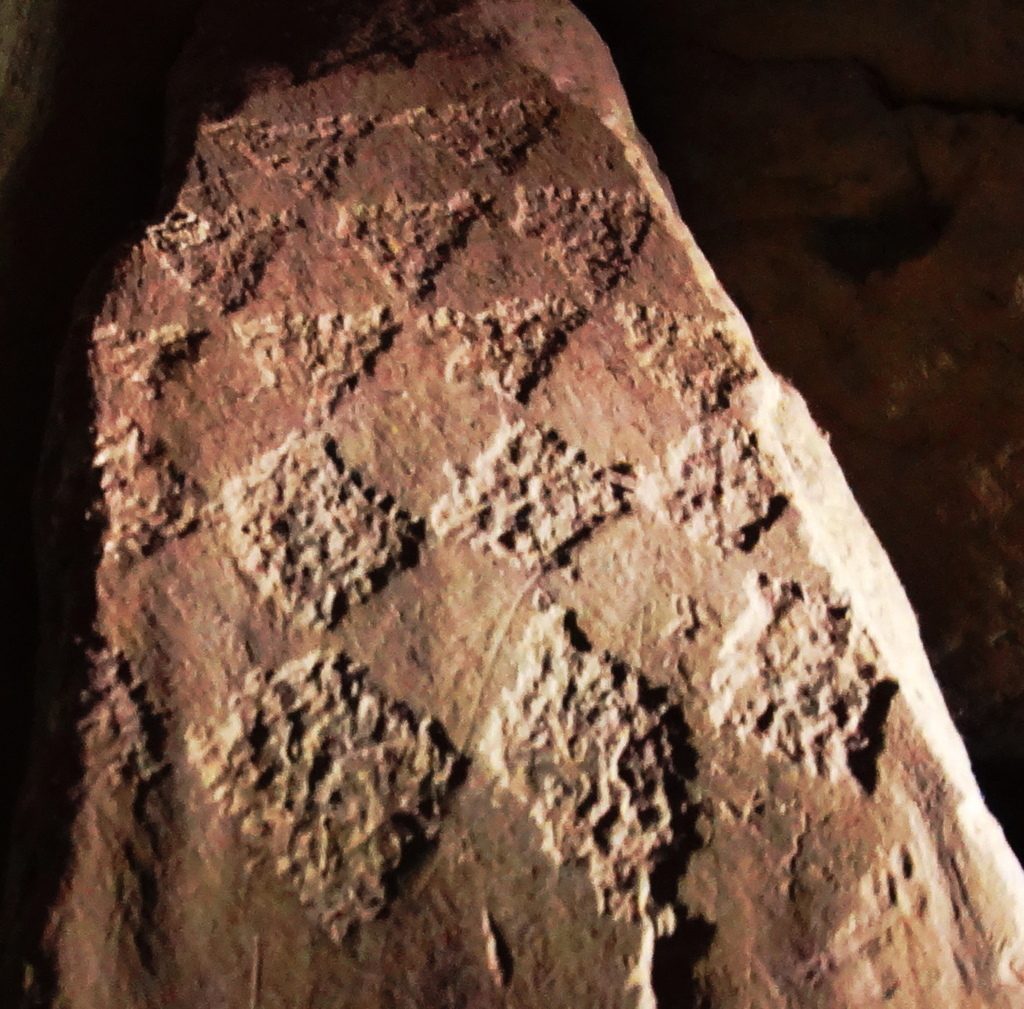
(Images of triangles: Above/Right/Left: New Grange Megalithic Temple, Ireland. One of the oldest in the world.)
The image below is yet another massive crafted equilateral triangular-stone, found in the Forests of Maine, near Katahdin. Notice the moss covering this stone. For this stone to be cut, and then so covered with moss in this way, means it has been like this for an extremely long period of time; most likely, the very beginning of time, not crafted in the last 500, or even 1000 years. More like 6000 years…
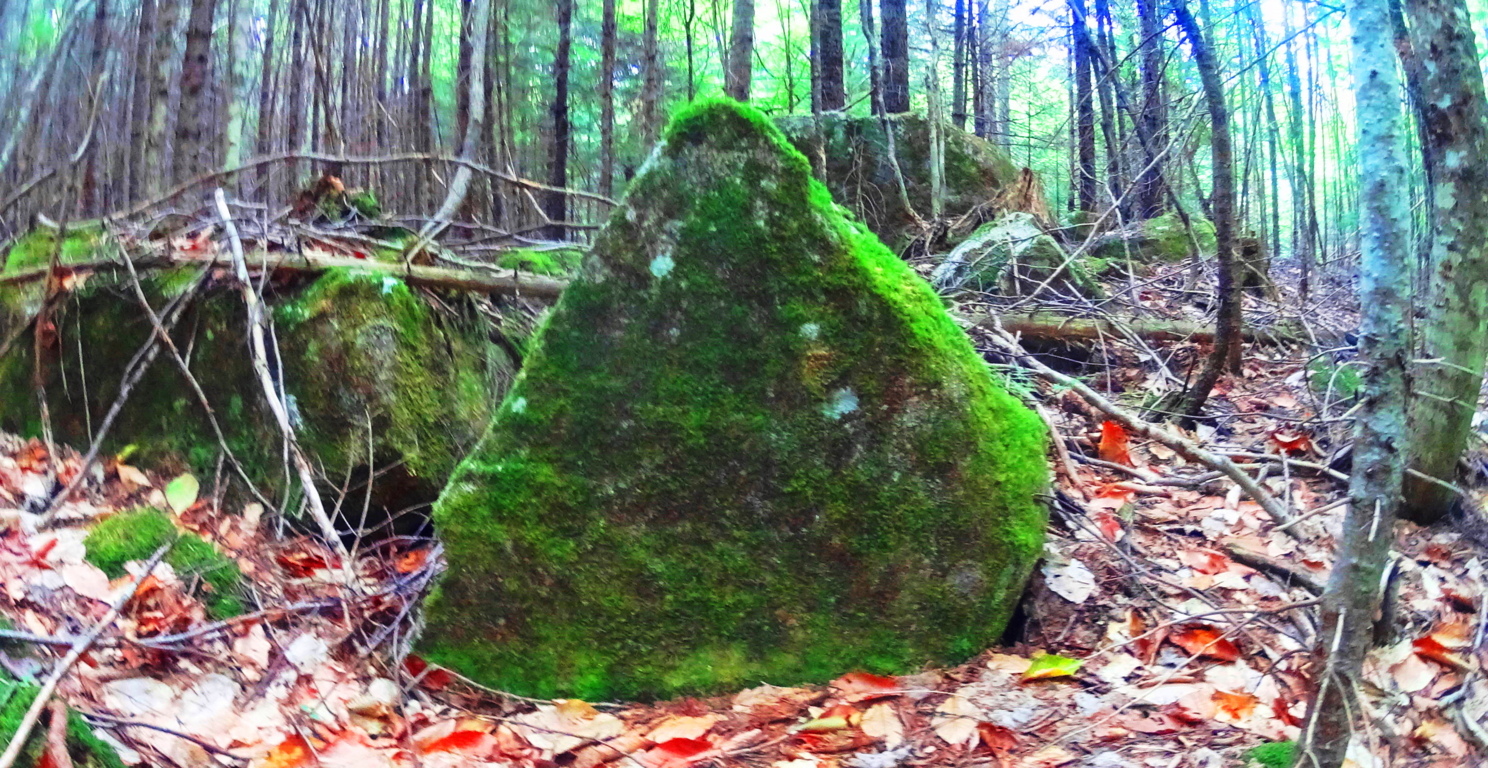

Pictured here, to the right, is another cut, equilateral triangular stone, that is not located in the forest of Maine, but rather, in the forests of Austria. Again, notice the similarity to the stone in Maine, 2500 miles away. And also, notice the indicator of construction in antiquity, alpine moss.
This stunning image to the right, was sent to me by my friend, and researcher, Gunnar Hiptmair, who continues to discover dozens of Neolithic anthropological statements and zones in the Austria and the Alps today. His Facebook profile can be reached directly, here: https://www.facebook.com/profile.php?id=100010469927936
Stemming from this, are countless other examples of equilateral triangles fixed into stone, in New England, and elsewhere. They are so abundant that it suffices to leave these examples to get the point across, and continue forward with the experience at Mount Moosilauke.
Logic About Constructing Megaliths: The ashlar-cut technology in creating these perfectly cut, flattened frontal faces of stone, does not indicate a technologically primitive Native American or Celtic culture(s). These stones were cut, and placed, in specific ways, weighing up to 50 to 100 tons. For Native tribes to move each one, would take a set of completely illogical circumstances, requiring human labor, a time frame, resources, and out-and-out permanence and dedication, that Native American or Celtic tribes would have found absolutely repugnant, annoying, and even ridiculous.
The Winter season in New England is long, deep, and hard. When Spring arrived for the Native tribes, after surviving the deadly Winters, do anthropologists actually think and defend the idea that the very first thing Native Tribes would do after migrating back to the newly warm northern temperatures is, first: go straight back to those impossibly massive stones that they were supposedly moving, before the previous Winter began, (utilizing every ounce of energy, and voluntarily-primitive ingenuity they had) They would immediately abandon their villages, loved ones, and their potential planting/fishing season, and crops, all to move giant rocks?
No. This never happened. It is absurd.
Something else is going on.
This is where things become extremely difficult for local researchers. They are limited to local narratives, local evidence, and local History. They simply cannot comprehend any possibilities outside of the Native American presence. They are forcing a narrative to credit Native American Cultures with the crafting of these megalithic statements, because it is the limit, contextually, historically, and logically, to what these local researchers can understand.
The fact is, there was an earlier Culture, in the Americas, as well as Europe and Israel, as described in every ancient account, and mythic history, which was dominant in these regions of the world. They were Megalithic builders, capable of incredible works of strength and design, that are so permanent, they are still around for us to see today. Let’s turn to the hiking experience for the moment, and move forward with the evidence at this beautiful Mountain.
Hiking Experience And Evidence at Moosliauke: As it is with every serious climb, you need to make sure you are prepared. This is a 4,805 foot climb. Please make sure you are being honest with yourself about how healthy you have been in the last year. Have you been eating right? Are you rested and calm? Have you been training for a tough incline for a few months previous? Do you have a portable water strainer to use in the flowing streams along the trail? And will you be ready to carry your portion of bottled water up the Mountain, on your back? Remember, you need to be hydrating, little by little, the whole way, up, and back. Like myself, you can bring a fully charged iPhone for safety purposes, and music. Bring some kick-ass headphones, and deepen your experience in portions of your climb. Choose a day with good weather, starting as early as possible, with the cool temperatures in the morning, and off you go.
Glencliff Trailhead: Glencliff Traihead, in Glencliff New Hampshire, is located on the ‘Benton State Forest’ side of the Mountain, known as the westerly approach to the peak. From Highway 25 in Glencliff , you will connect and turn right onto High St. You will see Mount Moosilauke to the right. The small trailhead sign, and sandy-square parking lot, about 1.5 miles down the country road on the right. If you reach Glencliff Elderly Home beyond the Trailhead, you’ve gone to far. Turn back, you’ll see it.
Making your way into Glencliff Trailhead, this lower 3rd of the Mountain takes you across a stream, a wide, open wild-field, and into a steady incline of a fairly wide, softened dirt trail in Benton State Forest.
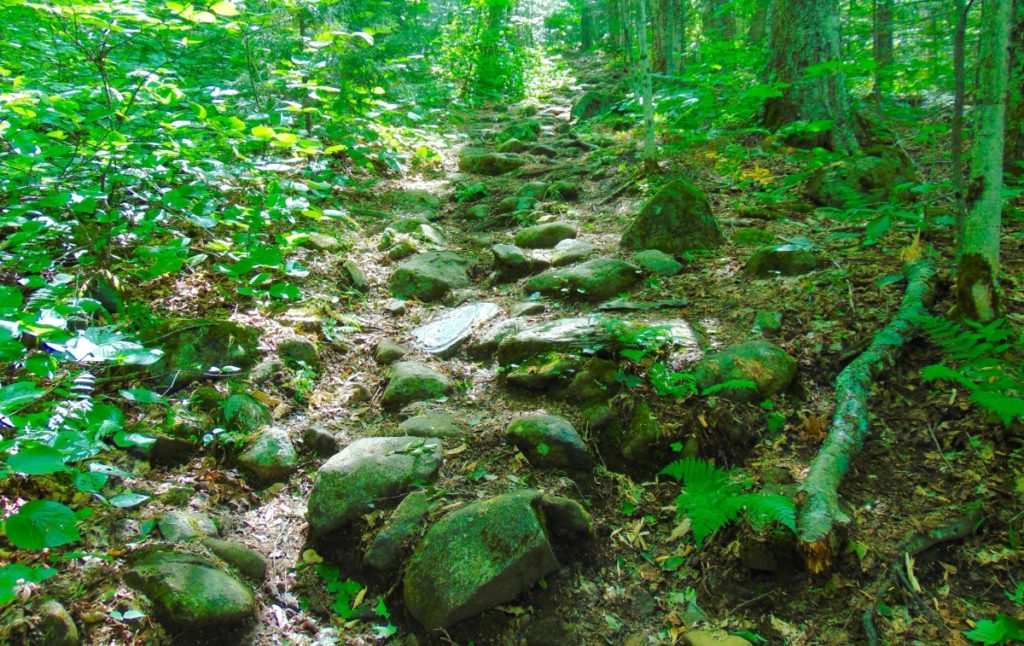
There is a distinct rocky trail that emerges as you steadily make your way up the path. Curiously, the stones seem funneled, collected specifically, in one distinct lining. It is clear that the stones are not sprawled out, as if by a rolling glacier. Stones are collected in one distinct line, straight through the Forest. Although it may be hard to consider for some, this is not random, or the work of The Park Service. As we continue up the Trail, evidence to this effect will emerge.
As the elevation increases the alpine aspects of the Trail emerge, with glowing mossy enclosures and tightening thickets of trees, growing right over the stones, in the cooler temperatures.
Here is strong natural evidence for the chronology of the ecological process in this area, dating all the way back to the beginning of time, if you know how to look, ecologically. It is abundantly clear, as you can see in the image above, that the geology, the rocks, were in the initial layer of the landscape, first. The forest clearly came long after. 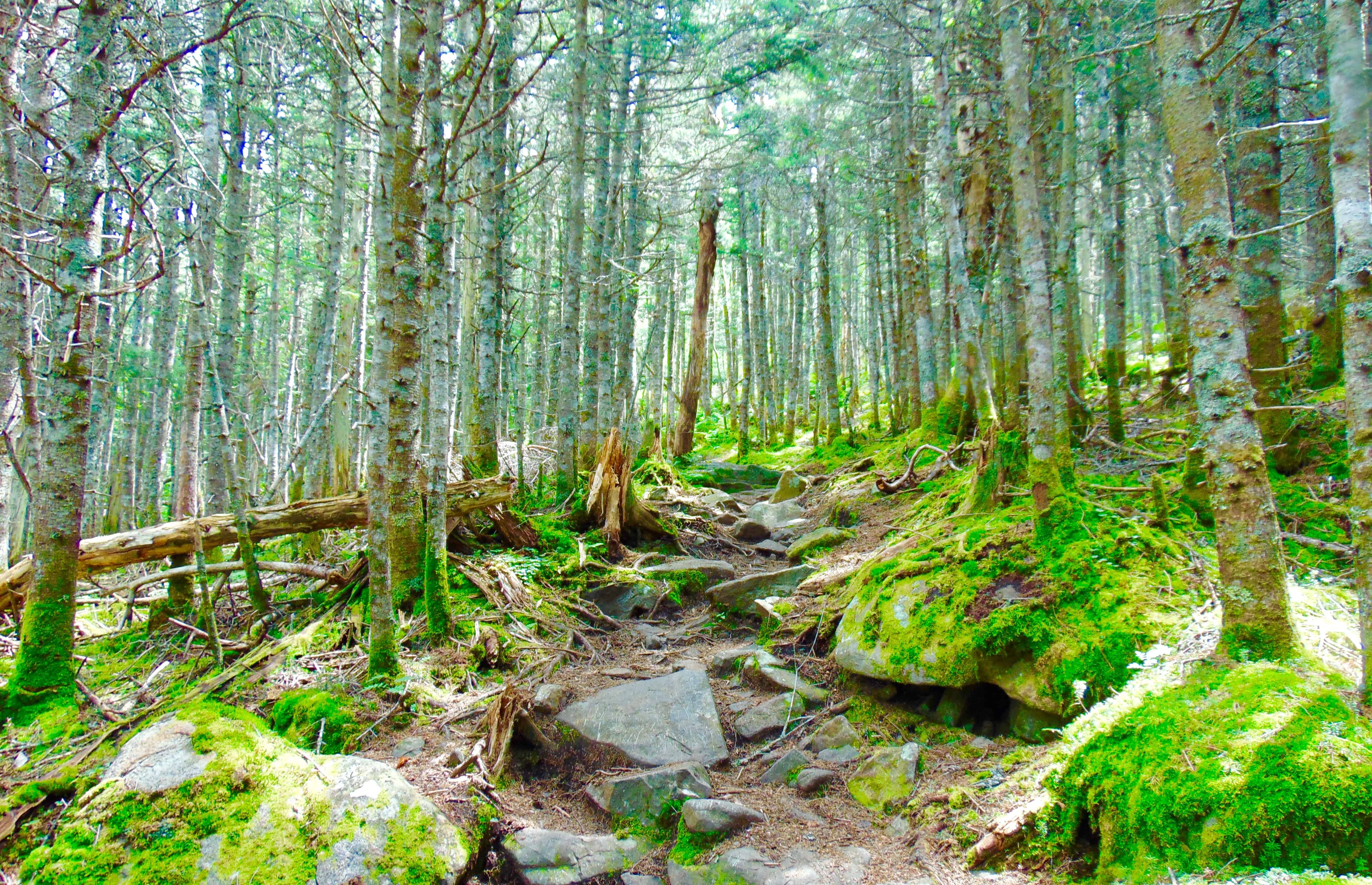
It is a challenge to established how many thousands of years the stones here sat without overgrowth on the open face of the Mountain (like they do in most Celtic Ranges). But it is clear that the Forest, in most areas, has grown up directly over the stones, as we see in the image above.
Please pay attention to the following ecological and anthropological points:
As you can see from the clear grey color of the stones on the pathway, there is no moss at all. This is because alpine moss is extremely sensitive to the touch, and will dissipate growth when contacted externally. The grey stones along the path look to have been ashlar-cut, and worked, distinct from the mossy stones that literally surrounding them. Notice how the pathway stones, the cut stones, have zero amounts of trees, or moss, on top of them? How is that possible? It is because from the earliest possible time, before the Forest had even grown over the rocks here, these stones were touched, and cut specifically as an approach to the peak? Yes. This is an intended pathway of Megalithic construct. It has remained as such, in use by the Native Culture that came long after, as sacred trails, continuing into modern use today.
Just think for a moment. Did the Native Americans cut the pathway stones on these mountains?
They didn’t claim to, so no. Did the Park Service use machines or tools, up to 4,805 ft, to literally cut chronologically related, and level boulders, into flattened halves specifically for stepping up the Mountain? And did they cut down all the trees along the way too? Or was the path always like this, from the very beginning? Please believe me when I tell you, readers and friends, that it would cost millions of dollars in this little country Town, to do such a thing. That never happened. This path, and the hundreds of stony mountain ashlar-cut paths in the Western hemisphere, are specifically crafted, by a Megalithic Culture; a Culture that was gifted technologically, and intent on possessing the Mountain, leaving codes of craftsmanship, from the beginning of Time.
I know this is intensely hard for laymen, and local researchrs to consider, with a locally controlled, “post-modern”-emphasized, public education system, that literally is designed to keep your mental framework historically revised, disconnected from any terrestrial evidence, and ignorant of what actual elite scientists, ecologists, antrhopologists in the government, and Universities, are well aware of. The evidence, scientific, chronological, and logical, indicates a highly advanced Megalithic Culture at the beginning of Time. The Native Americans, and Celts in Europe, knew these constructed paths and stoneworks were present long before they arrived. Just like Peruvian Inca Natives at Machu Piccu, the Megalithic works were there when they arrived. Natives had nothing to do with constructing them.
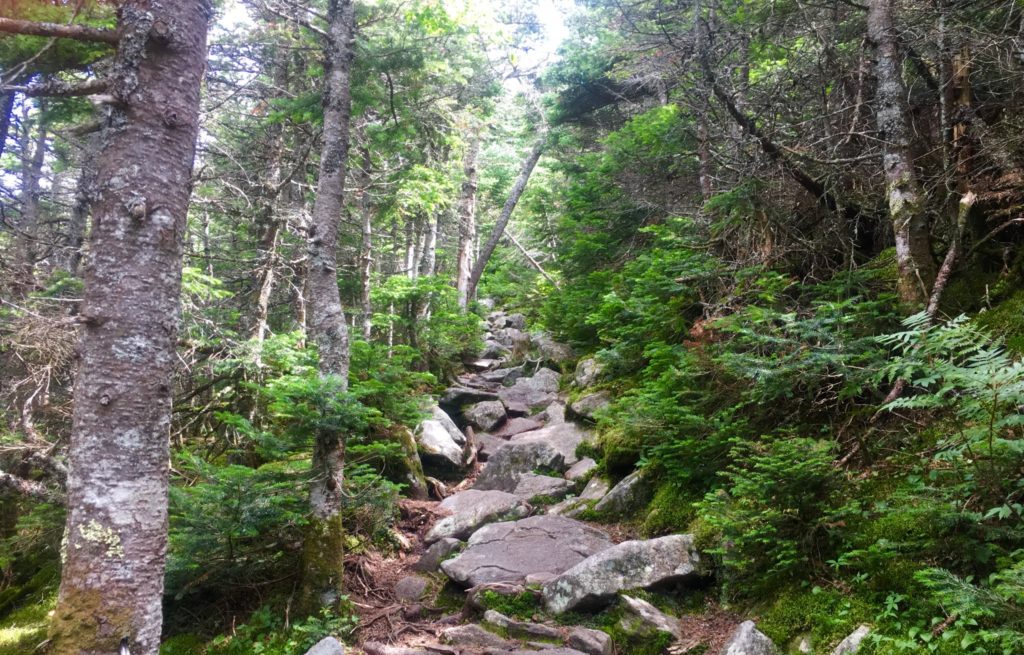
Hiking The Trail: Continuing up theTrail, you should take your time. You will pass two streams running across the path. Pause and take water here, cool off. Jump in! Fill your water bottles. From here, there is no more running water, and you will be on your own. The pathway in the upper 3rd of the Mountain begins to narrow intensely (Image/Above).
Alpine Pine Trees will begin to enclose the stone-steps before you. Here is a chance to pause, speak to the endearingly cool people that are coming and going along this path. While making big climbs, hikers often think and say things that are not common to their lives down below. It may be cathartic for you. Hikers might be needing to get a feeling, or statement out, especially during covid19’s quixotic grip on our society at the moment. Listen to what people are saying. Be kind. These moments could be profound. Singular elevated pathways like this are rare moments in your life. Pay attention.
As you breach the narrow path of the Pines, looking to your left. You begin to realize just how high you’ve climbed. (Image/Below) This is just a preview before completely breaking the tree-line. On a good day, visual potential could be up to 70 miles away, maybe further. Pause and realize, you’re doing a great job. 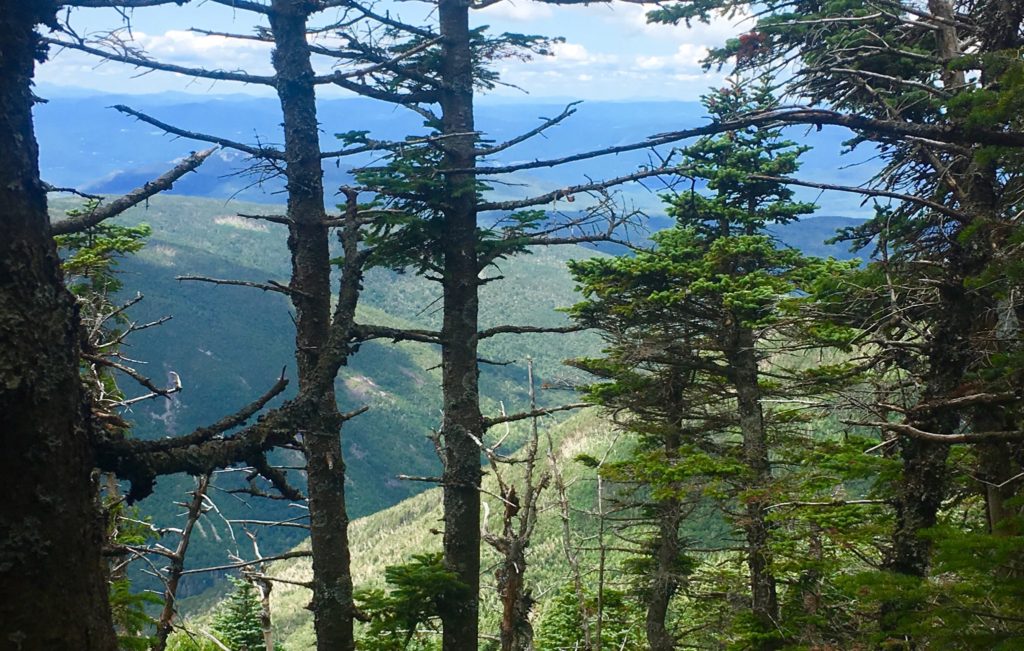
Things start to become pretty special as you continue the quest to break the alpine tree-line. The singular stony path ultimately ends, and you reach a stellar area of level ground with a crossroad of signs. There is the choice to head towards the South Peak, which is 20 minute interlude path to making the actual peak. Make sure you have the energy to take this 20 minute diversion to the view at The South Peak. I did not. I followed the sign pointing to the left, towards Moosilauke Peak.
The pathway here is magical. The relief and surprise of level ground after so much climbing is almost hilarious. It feels easy. This is a high porch, a singular pathway, like a rolled-out soily-soft-carpet, just for you to now come into this upper kingdom in the clouds that you’ve worked so hard to see. You can speedily make your way along the last 1.5 miles of your trek. 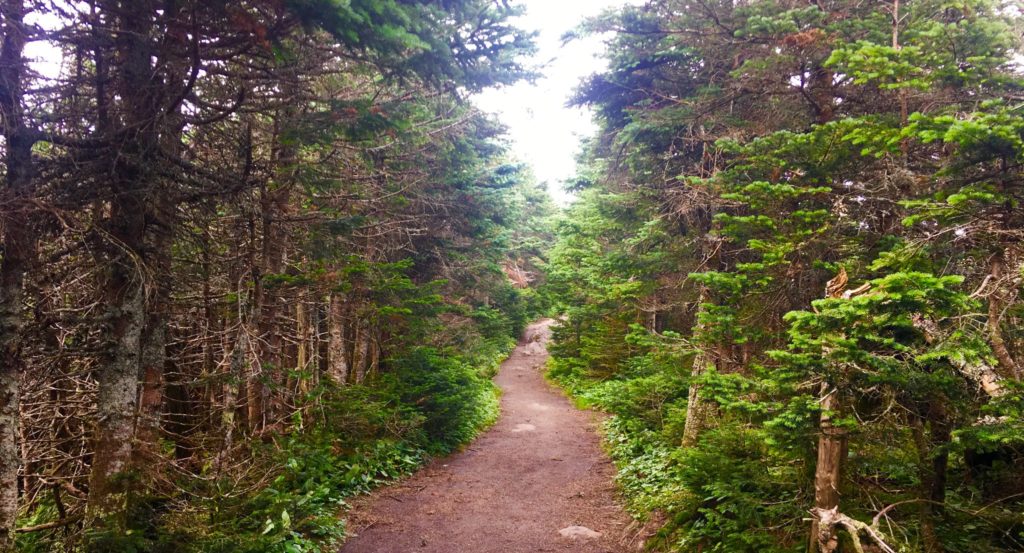
Along this rare level path, you can try to gather your strength. Take your time and enjoy what you’ve earned. It’s the same in life. Don’t go passing by quickly, what took a hard fight to find.
Along this regal and rare path, small stones begin to emerge. The stones are intricate, enchanted, and strange. They seem to be cut in a refined fashion. I have seen this manner of cut before. Take a good look at these stones.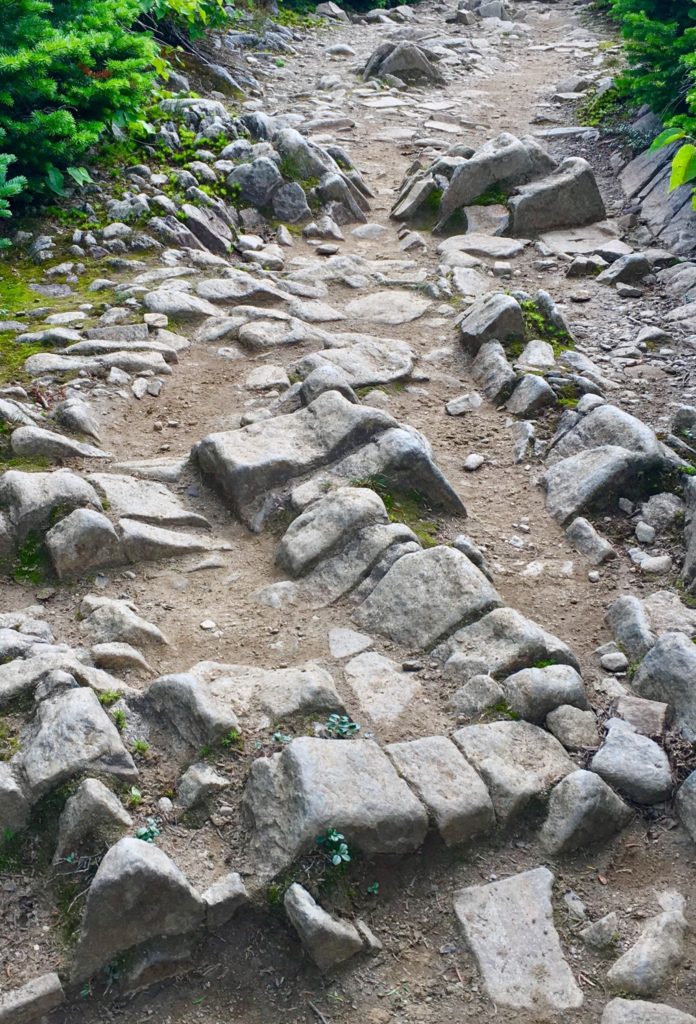 I am willing to bet, that digital analysis of these stone would reveal linearity, symmetry, modeling, and meaning. I am currently working on an ecological analysis system of these rare fixtures. The possibility that this is a miniature map, or modeled version of the overall area, is very real. As we will see, modeling the Mountain Range of the area was an essential practice for the Megalithic builders, in New England, and Europe.
I am willing to bet, that digital analysis of these stone would reveal linearity, symmetry, modeling, and meaning. I am currently working on an ecological analysis system of these rare fixtures. The possibility that this is a miniature map, or modeled version of the overall area, is very real. As we will see, modeling the Mountain Range of the area was an essential practice for the Megalithic builders, in New England, and Europe.
Aside from these theoretic connections, there is a location in Massachusetts that is one of the most sacred groves in the entire world. it is called ‘Bears Den’. At this location there is a hidden waterfall, with a dwelling near by. The entire area seems to have been engineered by a Megalithic builder. There are cut stones, leveled platforms, and the waterfall itself, which is engineered and dedicated, in stone, to (you guessed it) the equilateral triangle.
Images of the rear-side of the waterfall reveal some pretty incredible markings. They will look familiar to you now. Lets have a look at the markings in the rear of that altar. Look at the similarity of these small cut fixtures.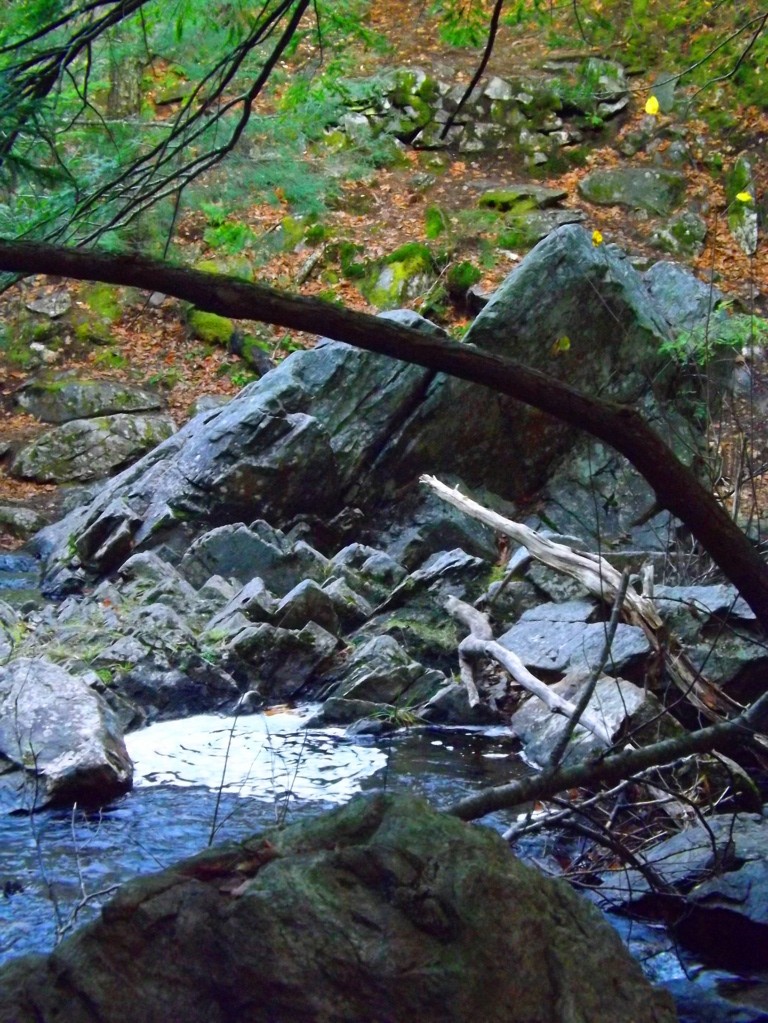
As I mentioned, on the frontal side of this waterfall, there are, etched in permanent stone, undeniable anthropological evidence of the equilateral triangle meme of the Megalithic Culture. 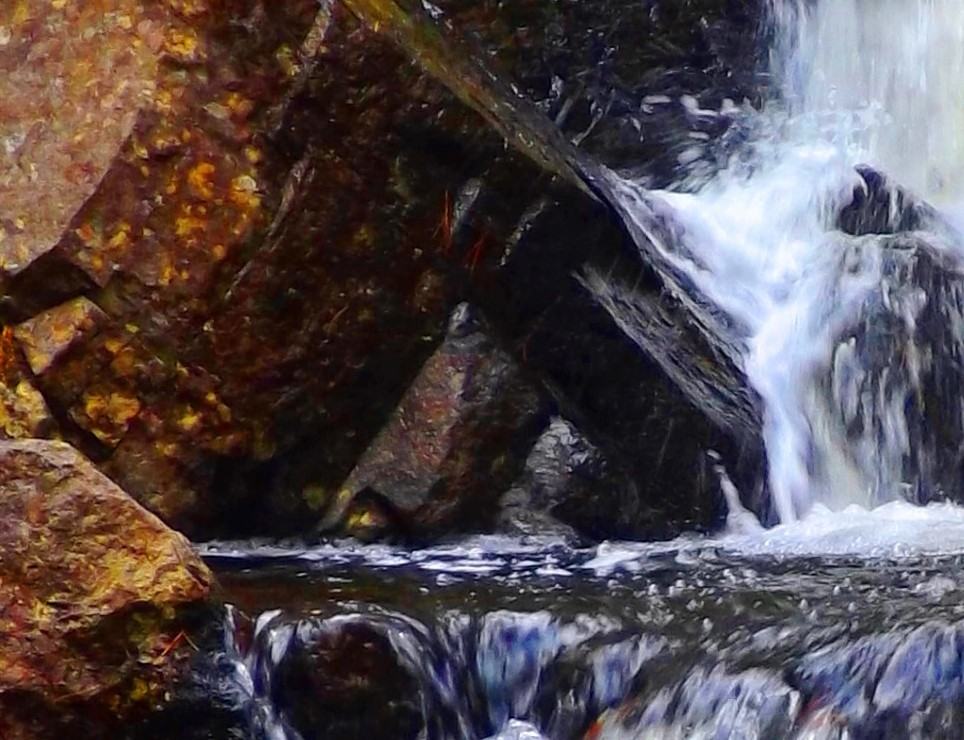
There it is, again. Perfectly etched in stone. The Equilateral Triangle. Do you think a glacier did that? If you do, then you need to think about how much of your thinking, is someone elses influence.
When are local researchers going to understand that the implications for this clear, and sometimes multi-layered Megalithic evidence, is far beyond the potential of any local nomadically oriented tribes, that have long since vanished? There would be literally millions complicated tools, and an emphasized ‘stone orientation to’ Native-American Culture, beyond anything that we know of them, if infact they constructed these works. They simply could not have done it.
Continuing passed many of these wonderful markings, the path unfolds into a miniature valley, leading up into what looks like a distinctly separate, miniature alpine-mountain. You’ve broken the tree-line. Here before you is what looks like a version the Sacred Mount of Arunachula in Southern India. The majesty of this 4,500 foot piece of elevated earth, is stellar, supreme, and absolutely sacred. 
This zone is protected by the State for its ecological rarity, but in truth, I believe that at the elite level, there are individuals who know that this area is a sacred anthropological zone. The stones here are doubly significant in meaning, compared to the moss.
The approach to the peak is pristine. In every direction, mountains and clouds.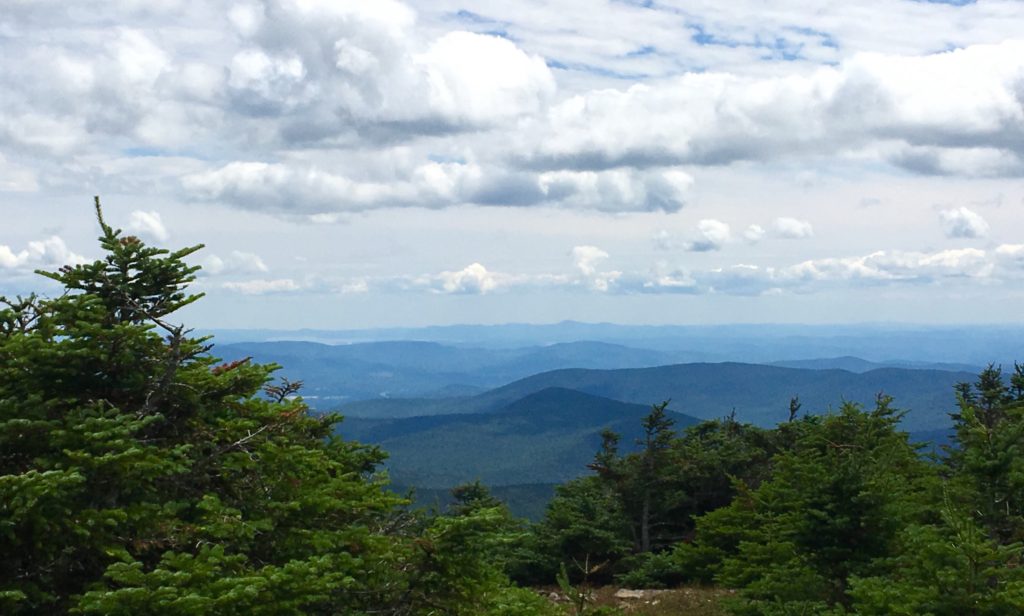
The trees fade out, while stone Cairns line the path. I believe these Cairns are Megalithic statements, perhaps refined by hikers in the last Century, but more likely crafted in antiquity. These Cairns are found even at minor peaks in the hill country. 
Certain stones along the final approaches at sacred mountains are cut with directionality, pointing directly to the peak. Here is a centrally placed directional stone, directly along the path, just before the peak. Perhaps it will help if readers can see some examples of this Megalithic meme on other locations.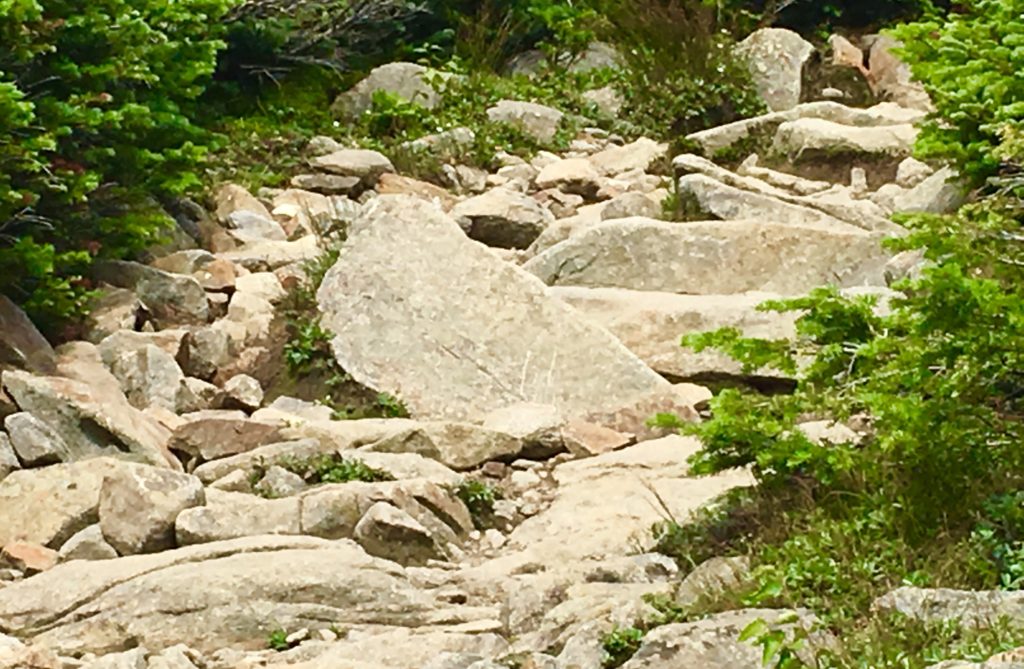 Directional stones have specific parallel sides, leading up to a right-angle-apex of exactly45 degrees.
Directional stones have specific parallel sides, leading up to a right-angle-apex of exactly45 degrees.
Sample 1: The image above, as you know, is located near the peak at Mount Moosilauke, New Hampshire. 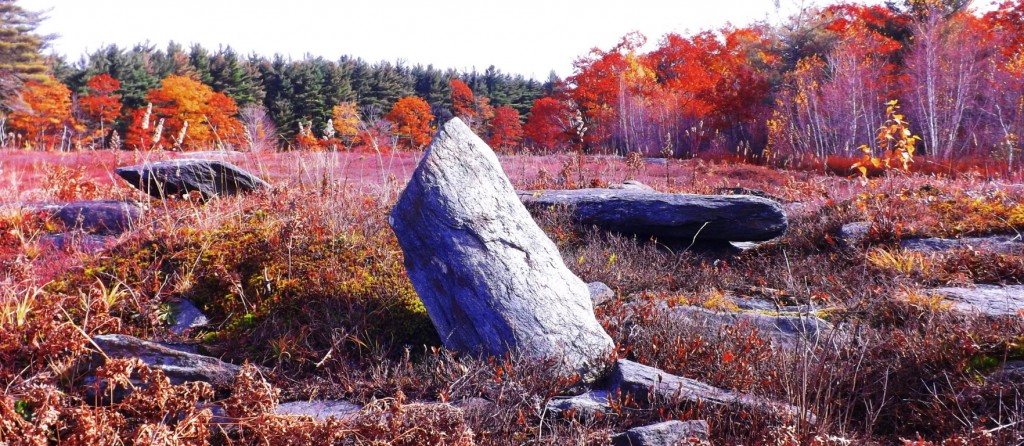 Sample 2: Directional stone located near The Altar at Heath Mass.
Sample 2: Directional stone located near The Altar at Heath Mass.
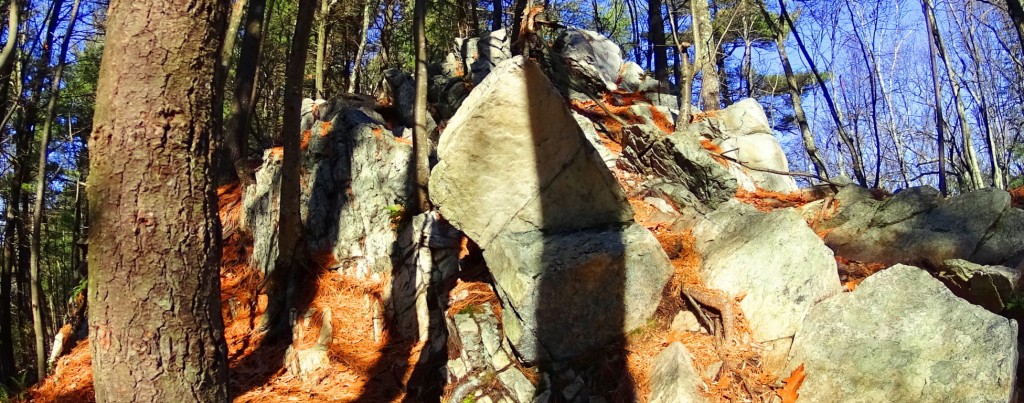 Sample 3: Located near the peak at Watatic Mountain, Massachusetts.
Sample 3: Located near the peak at Watatic Mountain, Massachusetts.
 Sample 4: Located near the peak at Monument Mountain in the Berkshire Range.
Sample 4: Located near the peak at Monument Mountain in the Berkshire Range.
Finally arriving at the peak, people are resting and taking in the scene. A large square stone sitting at the very peak is marked with a perfect equilateral cross-section, supported by a triangle in the lower corner. (Image/Below) These particular meme can also be found at dozens of peaks throughout New England, the American West, and Europe. Here are just a few examples below the one here at Mount Moosilauke. 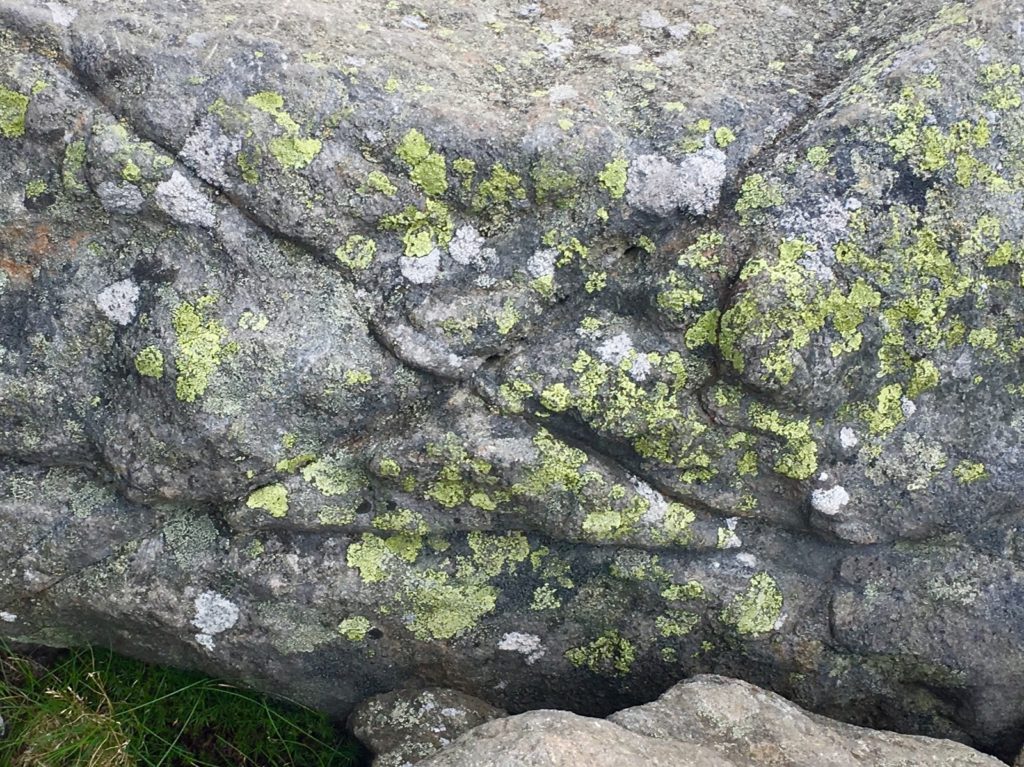
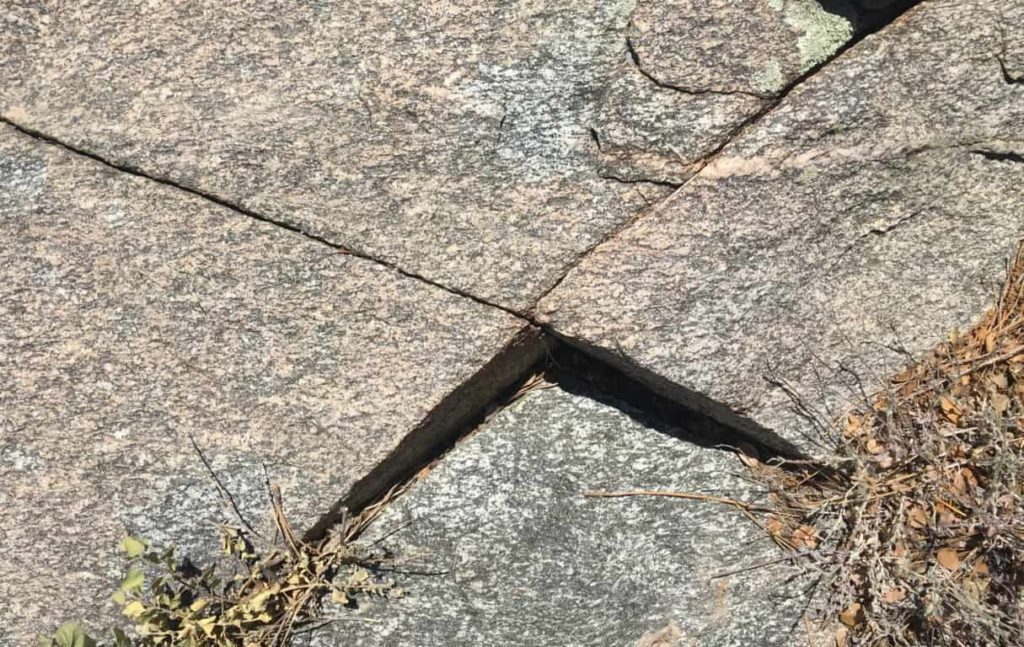
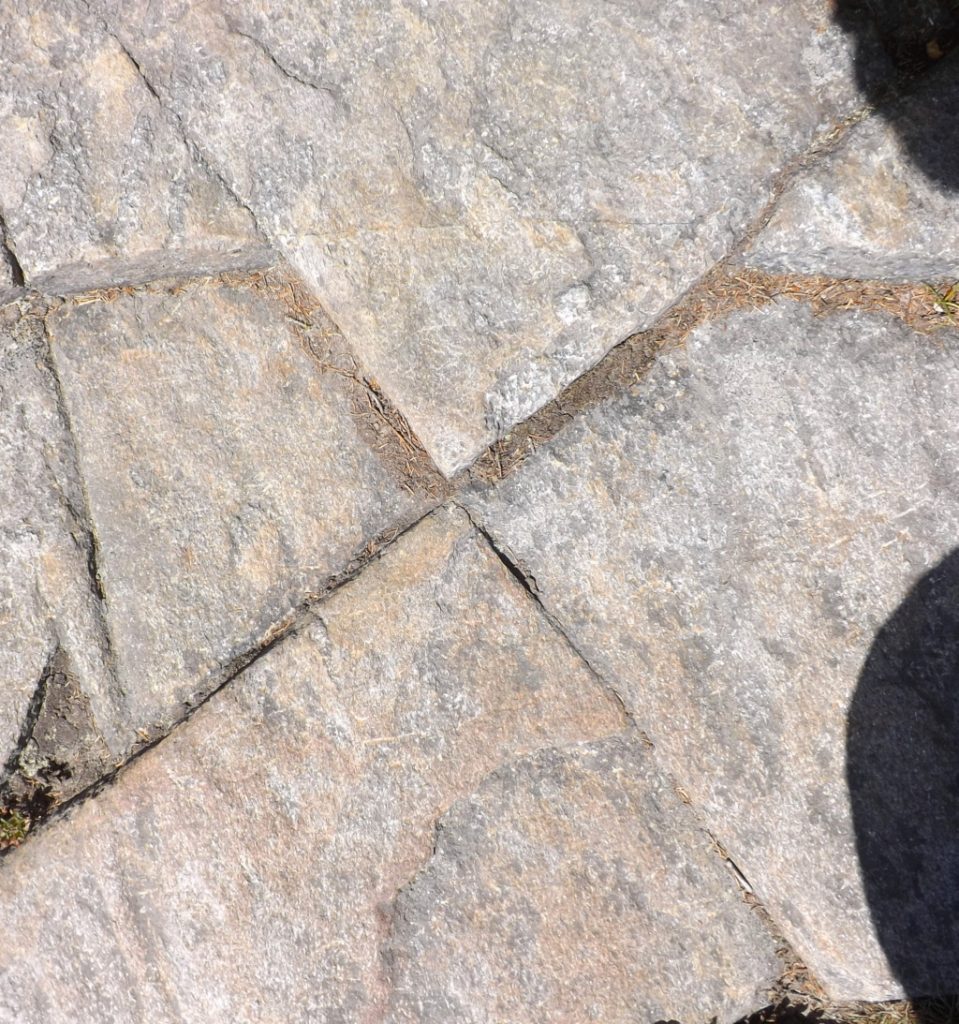
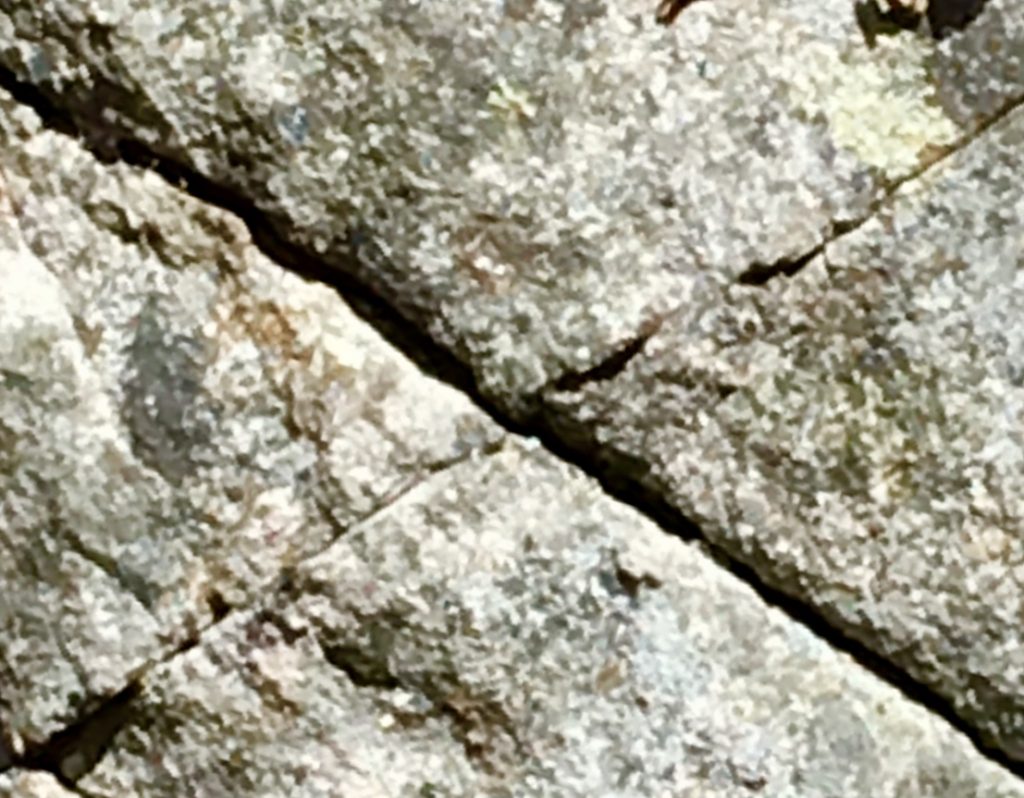
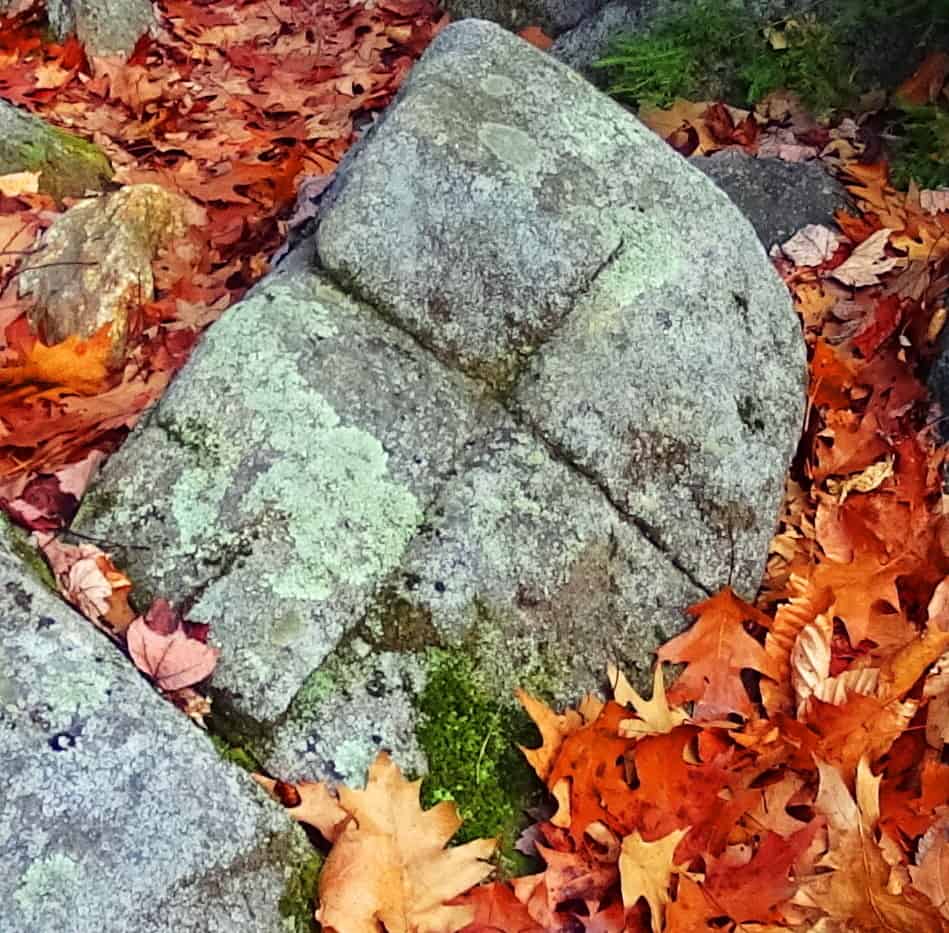
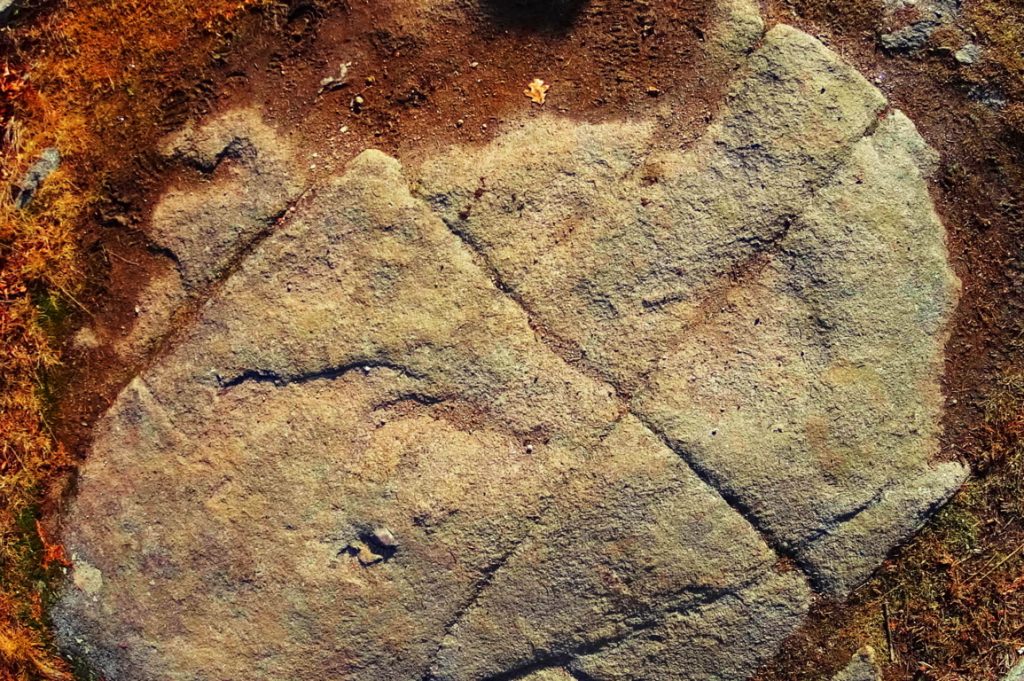
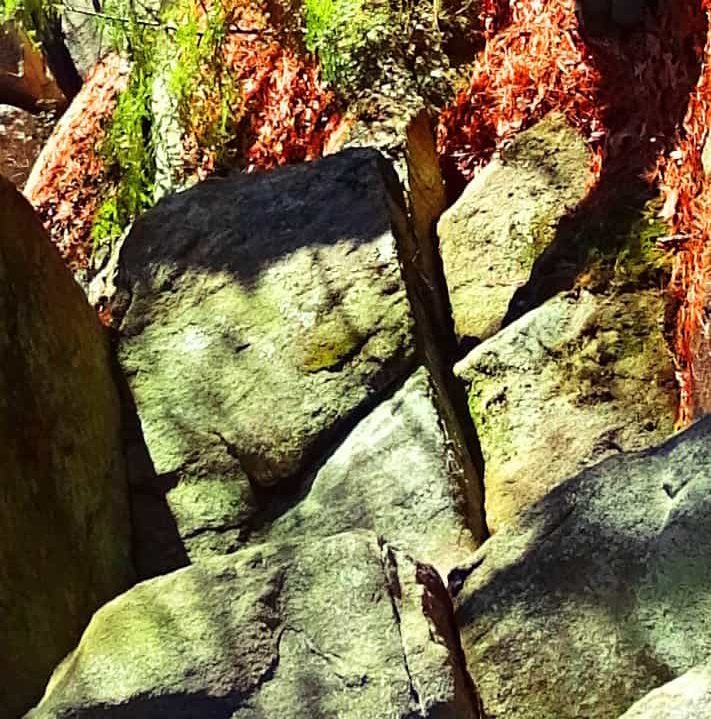
After this stone, the entire White Mountain Range comes into view. In the image below, Mount Washington can be seen in the distance, the highest point in the center. Mount Chocorua can also be seen to the right, below. Stunning. 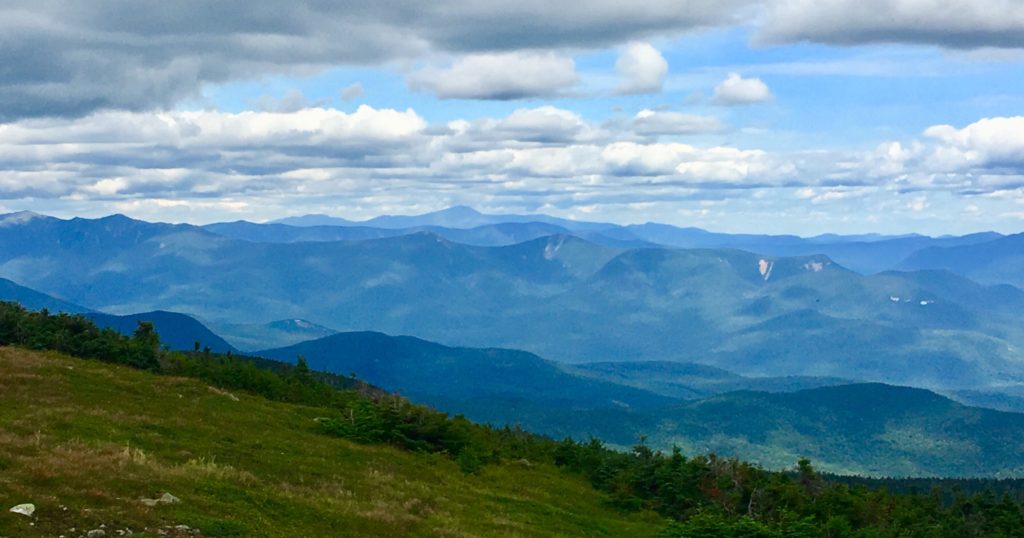
The view to the south, as seen below, is a rolling and rotund descent, with Massachusetts off in the descending peripheral distance.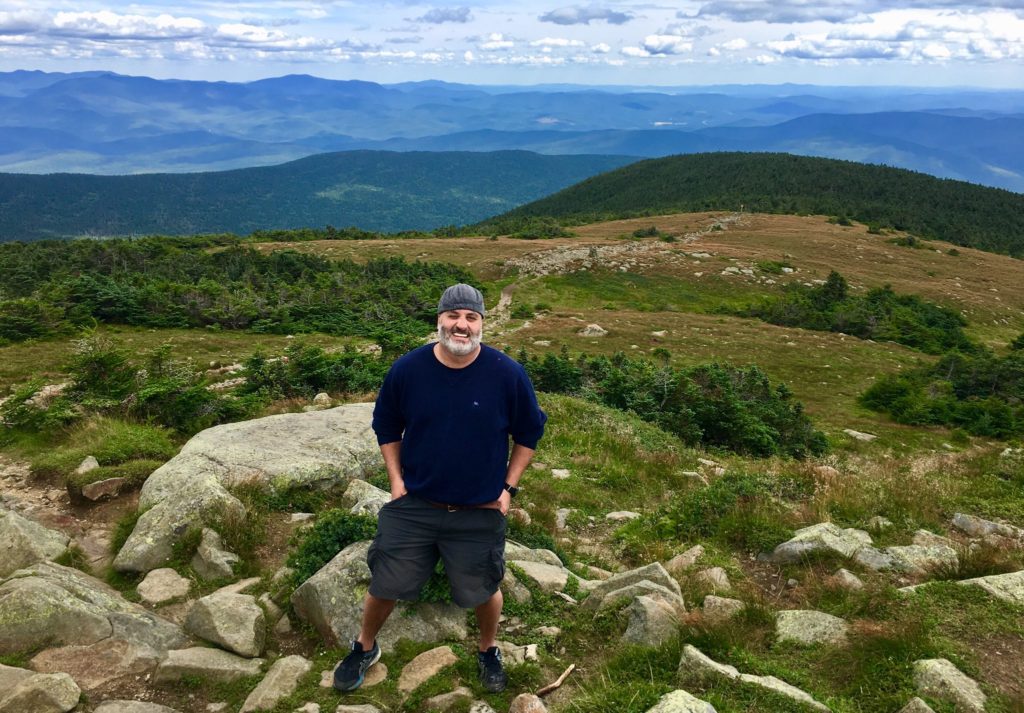
Another interesting fixture here at the peak is a very special arrangement of stones, with a leveled rock layer at the base of these specially stacked rocks, seemingly made specifically to imitate the cut of the mountain-tops, in the secondary background, of the peaks in the greater distance. Although dozens of people sat here at the peak, not one of them noticed this incredible fixture. Notice in the image below, the leveled work in the bottom portion of the rock, with what looks like distance markings of measure along it’s side. What is this doing at the top pf 4,805 foot mountain? This is no accident. These massive stones are placed to mimic the peaks in the secondary distance. 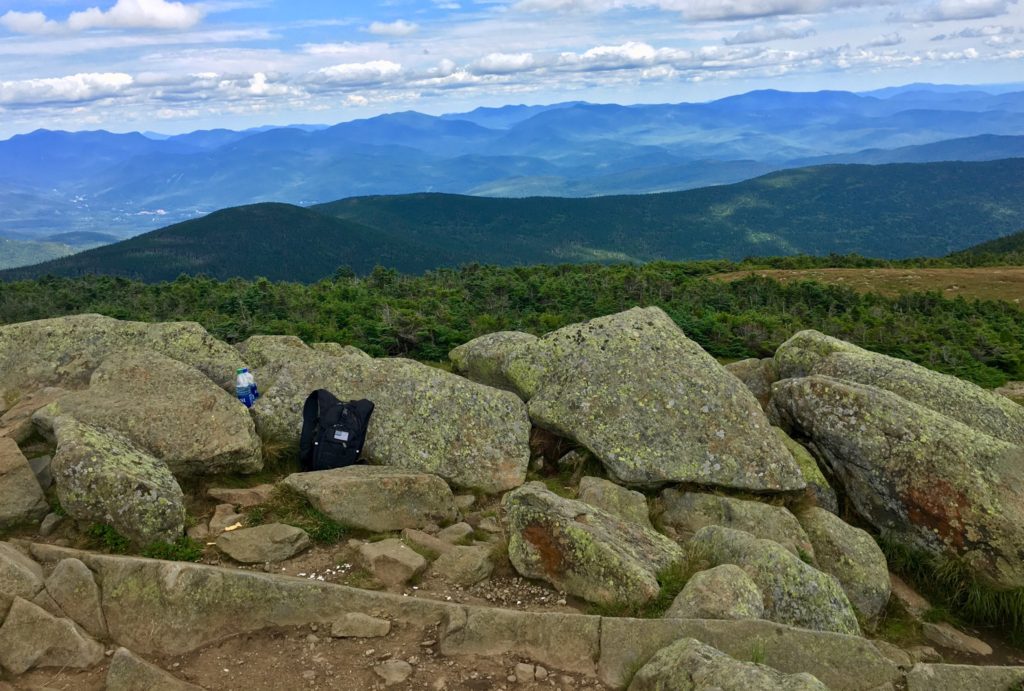
Let’s show another location that displays this type of fixture in Europe. At the peak at Mount Bearnagh, in The Mourn Range of Ireland, the peak contains a set of megalithic fixtures that absolutely imitate the peak of the mountains beyond. The stones are clearly cut, and fixed, into positions to imitate the angles of the ledges beyond. Again, this is clearly no accident, it’s incredible engineering, in stone. 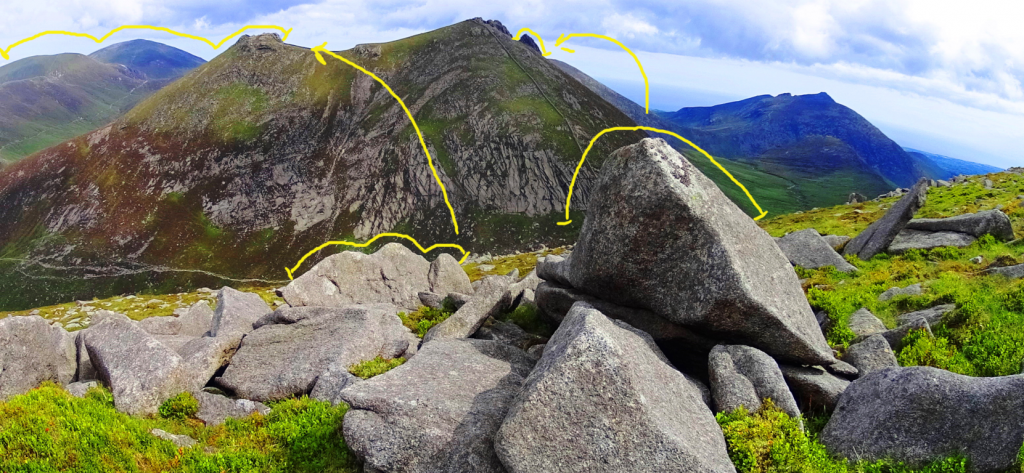 Here is a megalith also located at Mount Bearnagh in Ireland, absolutely crafted to imitate the curvature of the lower valley. At the peak, just one mile from this spot, the boulders are arranged to mimic the mountains of the Range beyond. There is no way that this is random! It’ s intentional, and cultural. How could we not see this!?
Here is a megalith also located at Mount Bearnagh in Ireland, absolutely crafted to imitate the curvature of the lower valley. At the peak, just one mile from this spot, the boulders are arranged to mimic the mountains of the Range beyond. There is no way that this is random! It’ s intentional, and cultural. How could we not see this!?
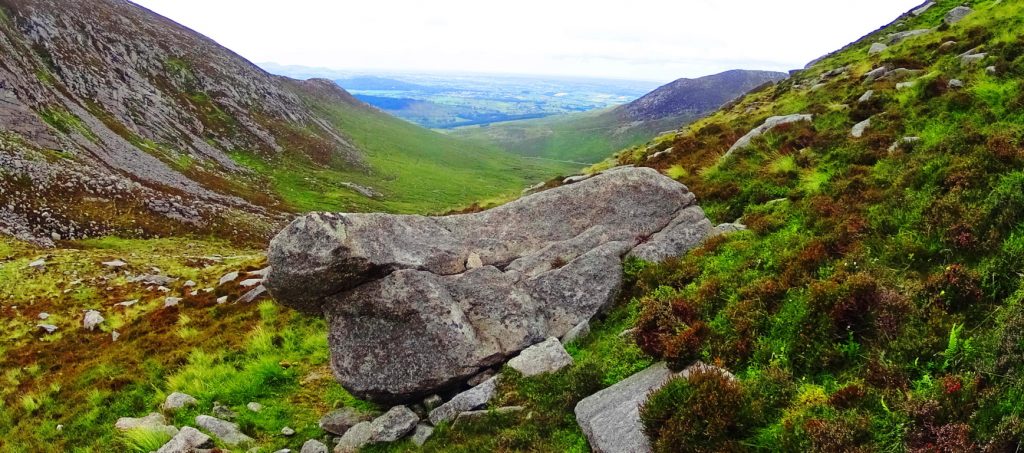 Other examples of stones-marking of peaks, at other mountains, can be found at Mount Katahdin, near the Knifes Edge approach. Look at this exquisite marker, roughly 5 feet tall, pointing directly to the peak in the distance.
Other examples of stones-marking of peaks, at other mountains, can be found at Mount Katahdin, near the Knifes Edge approach. Look at this exquisite marker, roughly 5 feet tall, pointing directly to the peak in the distance. 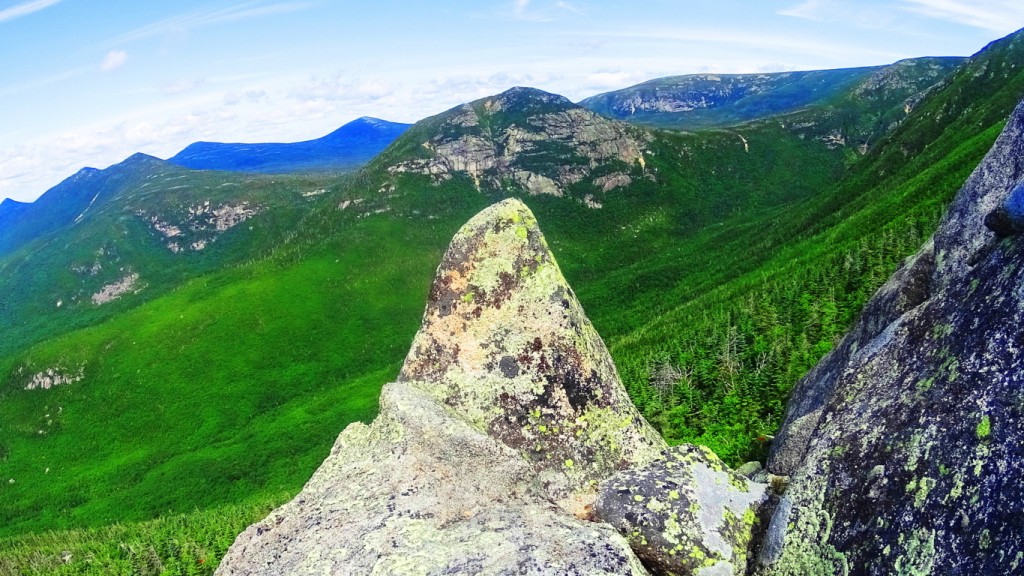
Here is a specifically crafted and placed-megalithic boulder, on the edge of the Sierra Nevada Mountains, in a lake, and shaped to look exactly like the mountains behind. Notice the 3 distinct indents in the boulder as well…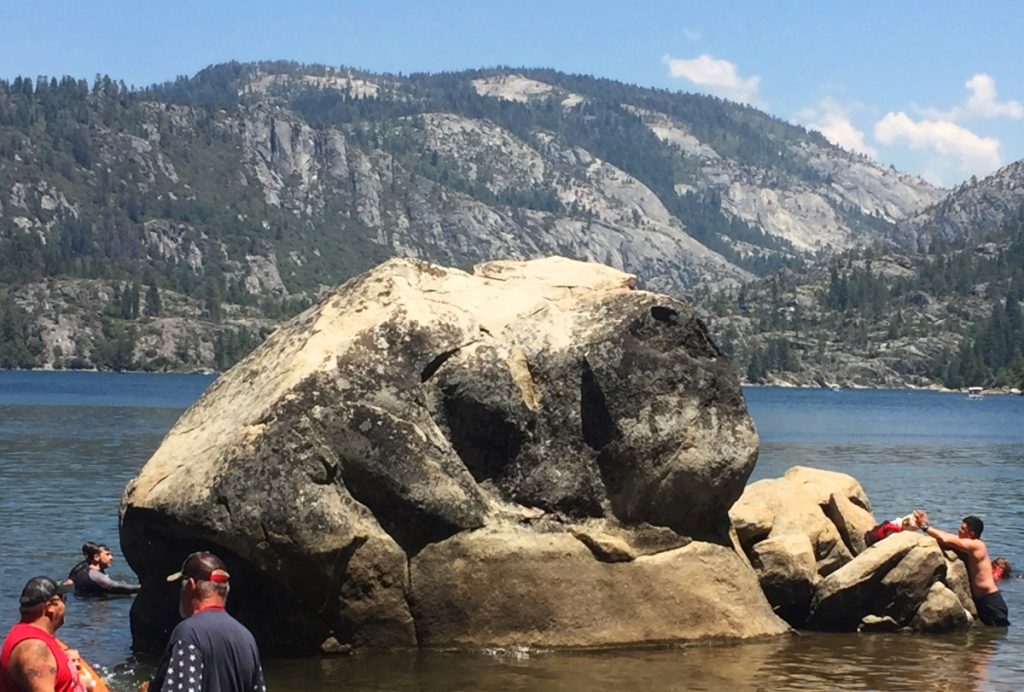
And here is a megalithic boulder at small peak at Upton Massachusetts. It is imitating the small mountain beyond, pointed perfectly to its center. Notice again, 3 distinct indents on the boulder. 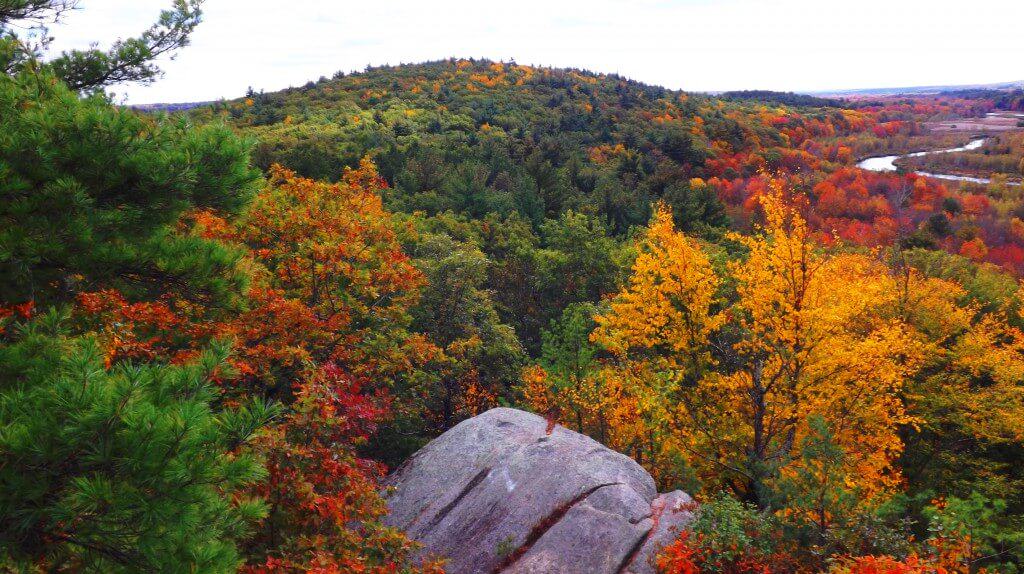
Not two miles from this very beautiful spot in Upton, is one of the finest megalithic chambers in all of New England. To think that these megalithic works are not related would be a serious mistake. They are absolutely related. The Culture that created these works was obviously capable of megalithic design, and large scale. 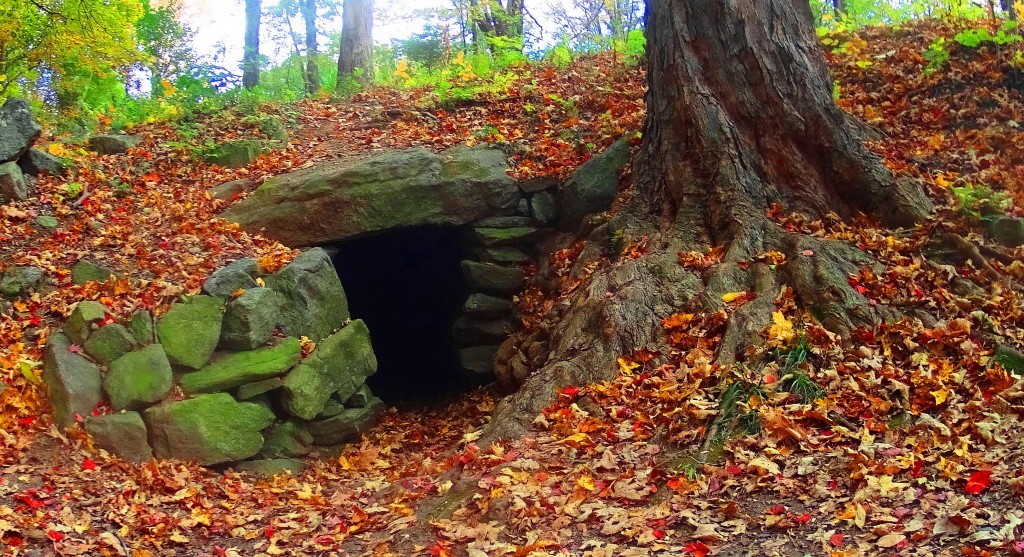
The accumulating Megalithic evidence here at Mount Moosilauke, with multiple supported examples from other locations, of memes and fixtures of the exact same stylization, should begin to give serious academic pause for those who have not had the capability to see this evidence, but are now clearly seeing it collected here. Site after site, peak after peak, from Glenn Coe Scotland, to the Sierra Nevada, (and everything in between) are consistent similarities of a single Megalithic Culture, not variations of statements from hundreds of Native Tribes, both Celtic, and American. The evidence point to a Culture that had a singular source of related concepts.
The final Megalithic constructs statements here at the peak of Mount Moosilauke, are perhaps the most important. We find nothing less than an entire complex of leveled stones, stacked into defined sections, spanning perhaps 70 by 30 yards. In its current state it is dilapidated, but a closer look reveals definite distinction, and intended design.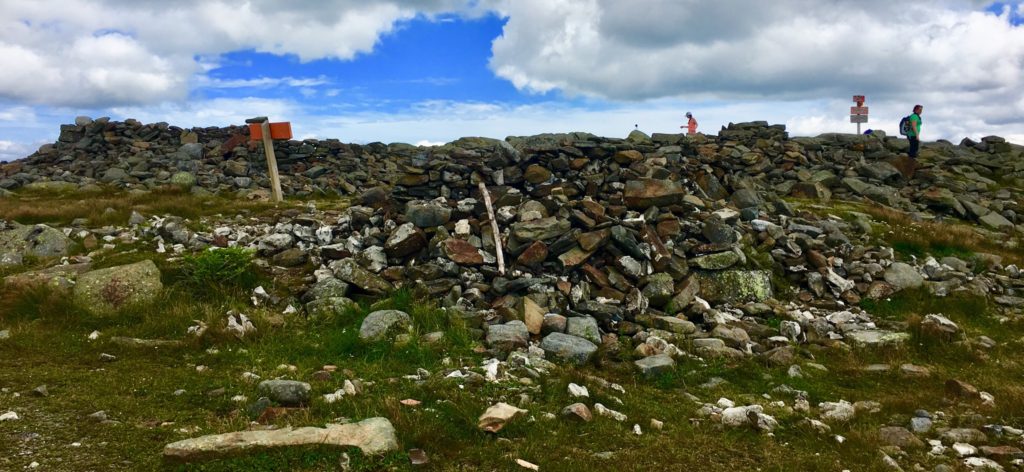
There a several divided square sections of cut, stacked, and leveled stones, which appear to define a particular function within. The section in the image below is absolutely level with the dramatic skyline to the north. There are clearly long and level cut stones worked into this construct, as can be seen, and were most likely crafted specifically for this purpose. 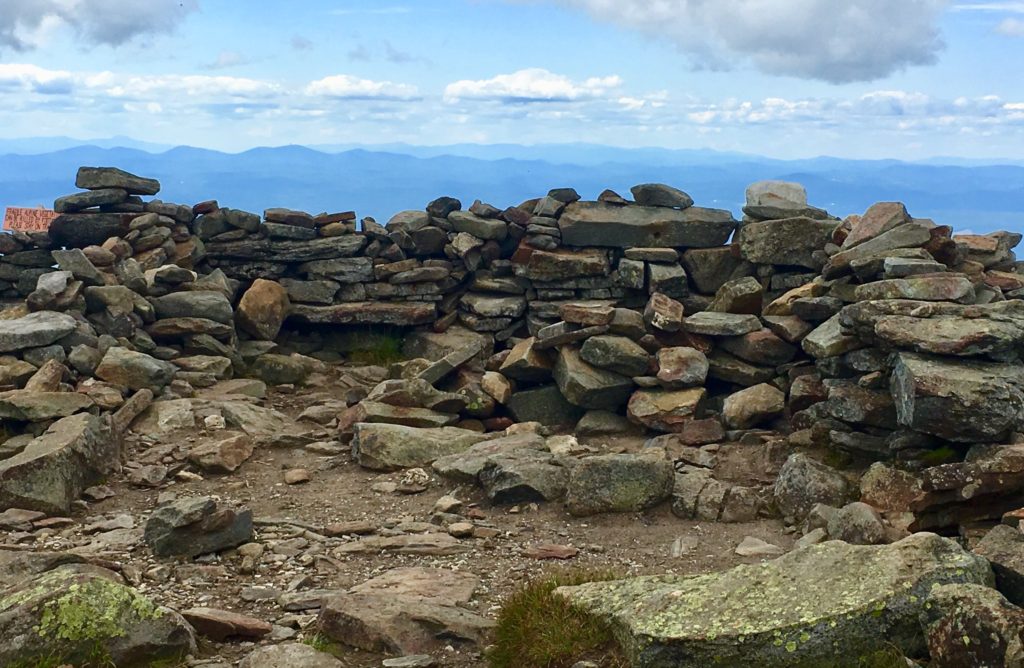
A frontal view of this square space reveals a significant 7 foot high lining of stone, which has clearly been tampered with over time, without any real protections. This particular view shows the significant amount of substance that this Megalithic Chamber once contained. 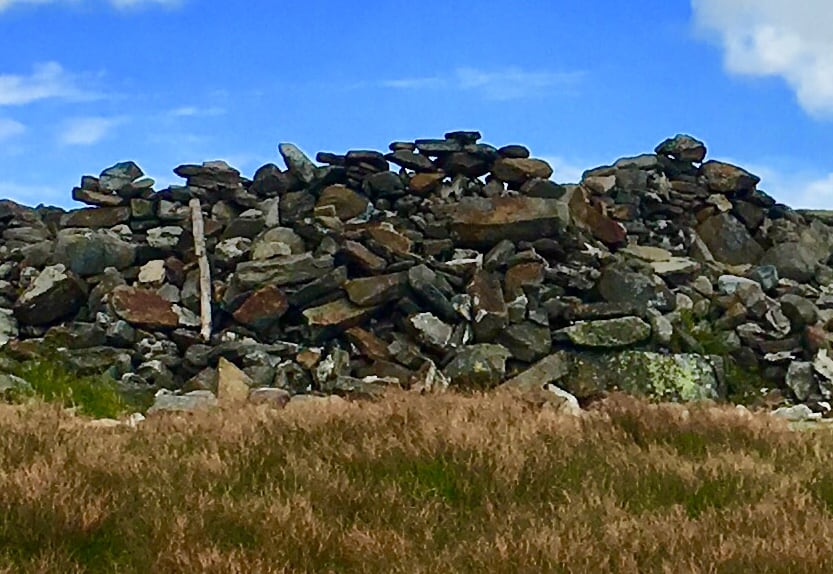
In stark contrast to the square spaces, there is a rounded space, separate from the main constructs, that may have had an alternate purpose, with its alternate shape. 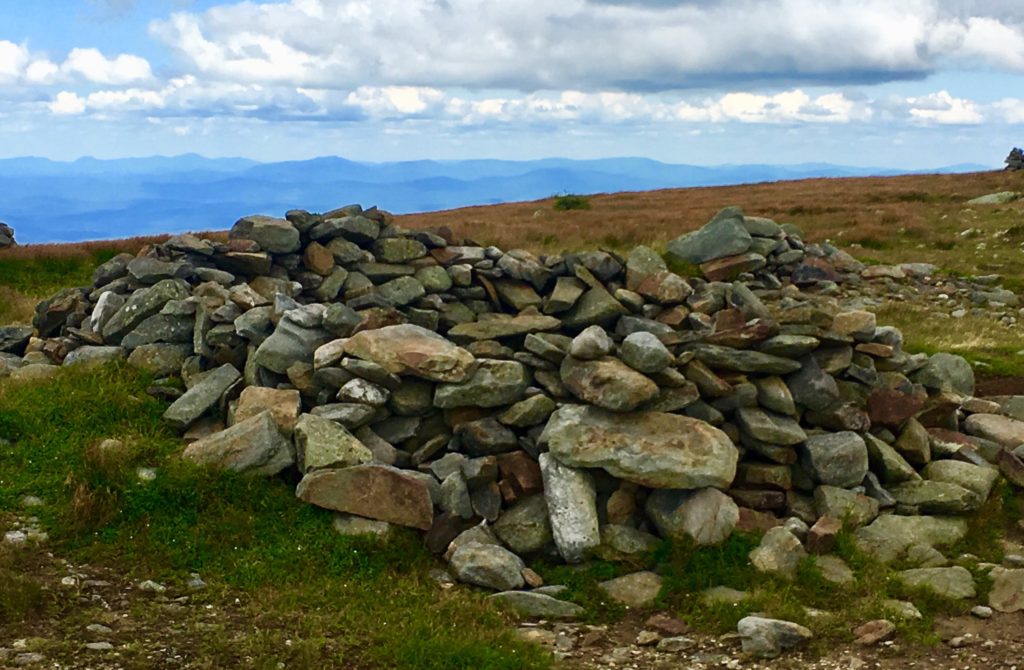 This rounded setting immediately reminded me of another set of rounded Megalithic stones, found in a highly megalithic area, and at a significant elevationm in the Mourn Mountains of Ireland. (Image/Below)
This rounded setting immediately reminded me of another set of rounded Megalithic stones, found in a highly megalithic area, and at a significant elevationm in the Mourn Mountains of Ireland. (Image/Below) 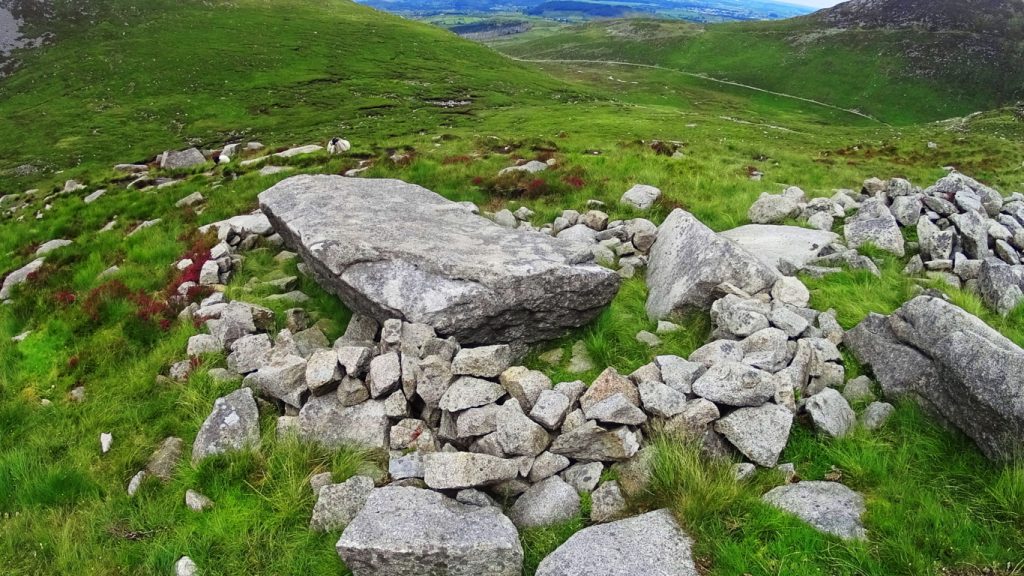 These areas should absolutely be considered National Heritage Sites and archaeological zones, fully acknowledged as a Megalithic Cultural spaces. And yet most passersby simply believe them to be random piles of rocks. How this is being allowed to remain the case is beyond me. There is meaning and intent attached to every one of these works, yet to be understood by so many.
These areas should absolutely be considered National Heritage Sites and archaeological zones, fully acknowledged as a Megalithic Cultural spaces. And yet most passersby simply believe them to be random piles of rocks. How this is being allowed to remain the case is beyond me. There is meaning and intent attached to every one of these works, yet to be understood by so many.
For day hikers, the journey is only halfway done at the peak.
After resting, you need to steadily make your way back down the Mountain. When you make it to the first bubbling stream of water, about 1/3rd the way down, to refill your bottles with your strainer, you will be safe for the rest of the journey. During a trek along a decline, be careful to set your feet squarely, to choose your steps, in order not to turn your ankle. As you make your way, the path will widen, and inevitably drift with the gravity back to the Valley below. I hope hiking sojourners decide to try this climb for themselves, and experience what has been described here. Don’t let anything stop you from continuing to seek out sacred landscapes; Not others, not yourself, and not Covid19, in all its bizarre quixotic strangeness. So many people are waking-up, and truly realizing, that time in the Sun, and in the sacred landscape, is the answer. Thanks for reading. 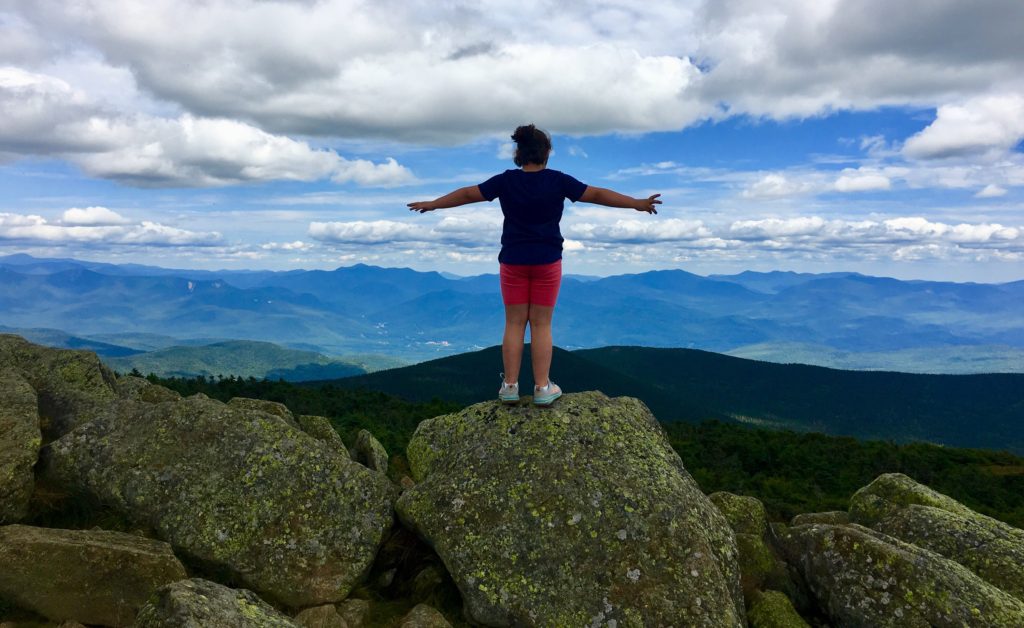
Mount Chocorua
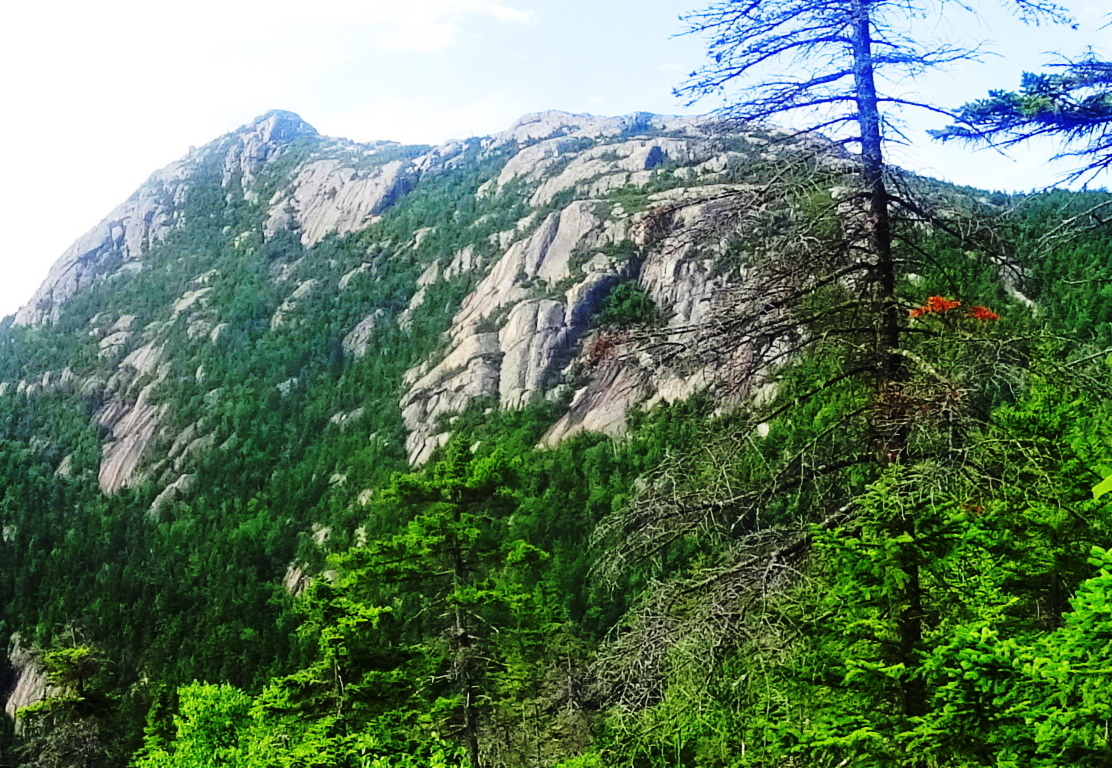
Location: Albany, New Hampshire/USA
Elevation: 3,478ft
Note: At the southern edge of The White Mountain National Forest of New Hampshire, sits the rocky, Pine-covered-peak of Mount Chocorua. The White Mountains are part of the grand Appalachian Trail, which runs 1500 miles south, all the way to Mount Springer in Georgia. About 50 miles directly north of Chocorua is the largest and most famous of the White Mountains, Mount Washington, standing at 6,289 ft. In the 50 miles between Chocorua and Washington are nearly a dozen seemingly animated peaks, all of which can be seen from a stellar vista at the top of Mount Chocorua, some 3,478 ft high.
Trail: Starting out, take Rt 16 to Moulton Drive in New Hampshire, which is a short length dirt road located behind an old antique store. Moulton Drive takes you to the Car Park for ‘Piper Trail’, the best approach at Chocorua Mountain. Start as early as you can, and bring plenty of water, New Hampshire in the Summer can be hot and humid. It is about 3.5 miles to the peak, so be ready for a solid seven mile hike, including a challenging rocky incline to get above the treeline.
At the beginning of Piper Trail you are enveloped by tall White-Pines, rusty colored Red Spruces, Ash, and Balsam trees. Further up the trail, bright Birch groves appear like miniature pillars protesting the hazy green shimmering of millions of leaves. After about a mile, you will cross the Chocorua River, and begin the slight elevation. This slight incline runs along a pristine forest ledge which carries a cool breeze through the shade.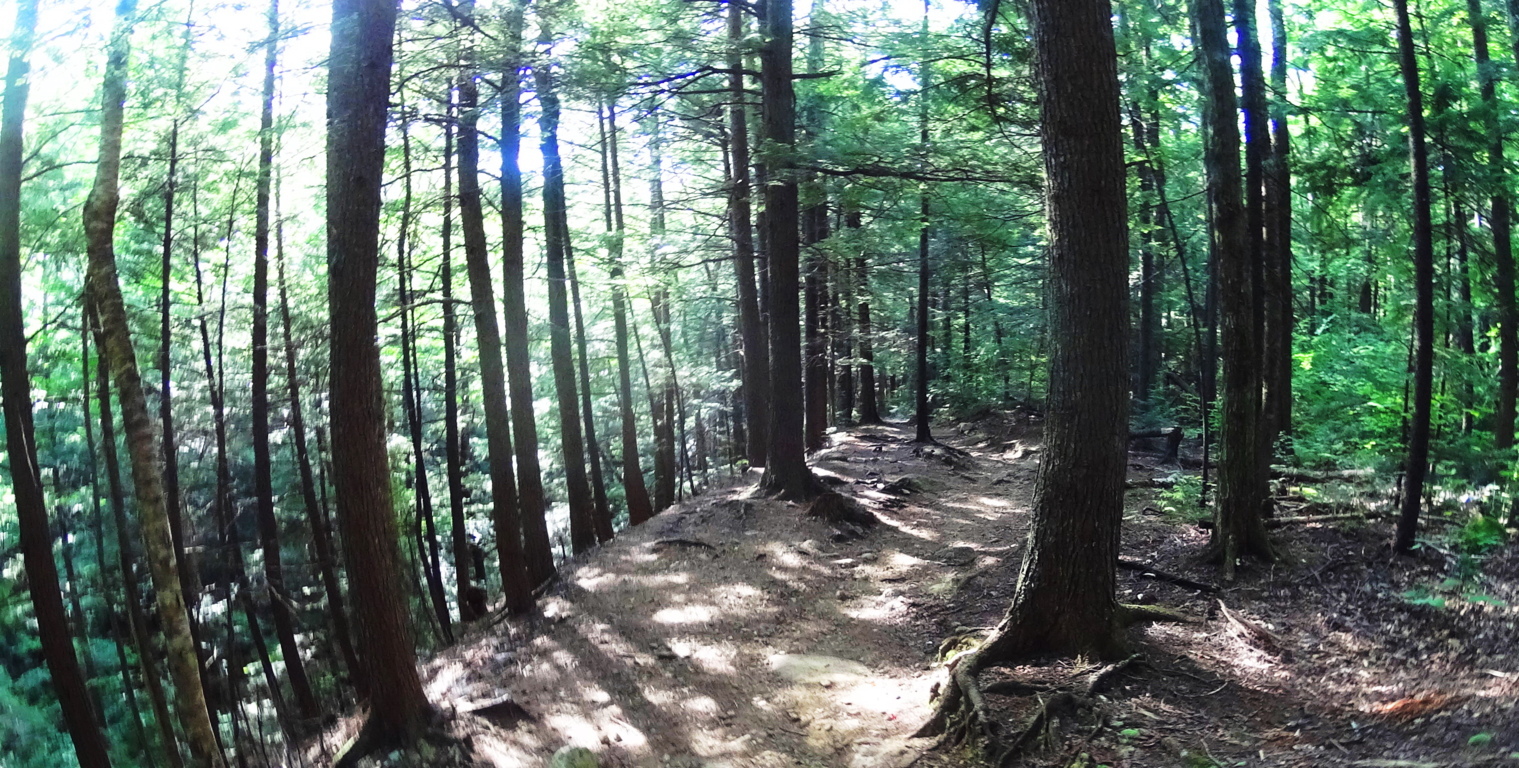 As you continue you will come across free-sitting-boulders beside the trail, which are mingled with the vast hedges running straight up the mountain. These glades continue northeast and west, rolling for 60 protected miles that contains Black Bears, Caribou, and White Tail Deer.
As you continue you will come across free-sitting-boulders beside the trail, which are mingled with the vast hedges running straight up the mountain. These glades continue northeast and west, rolling for 60 protected miles that contains Black Bears, Caribou, and White Tail Deer.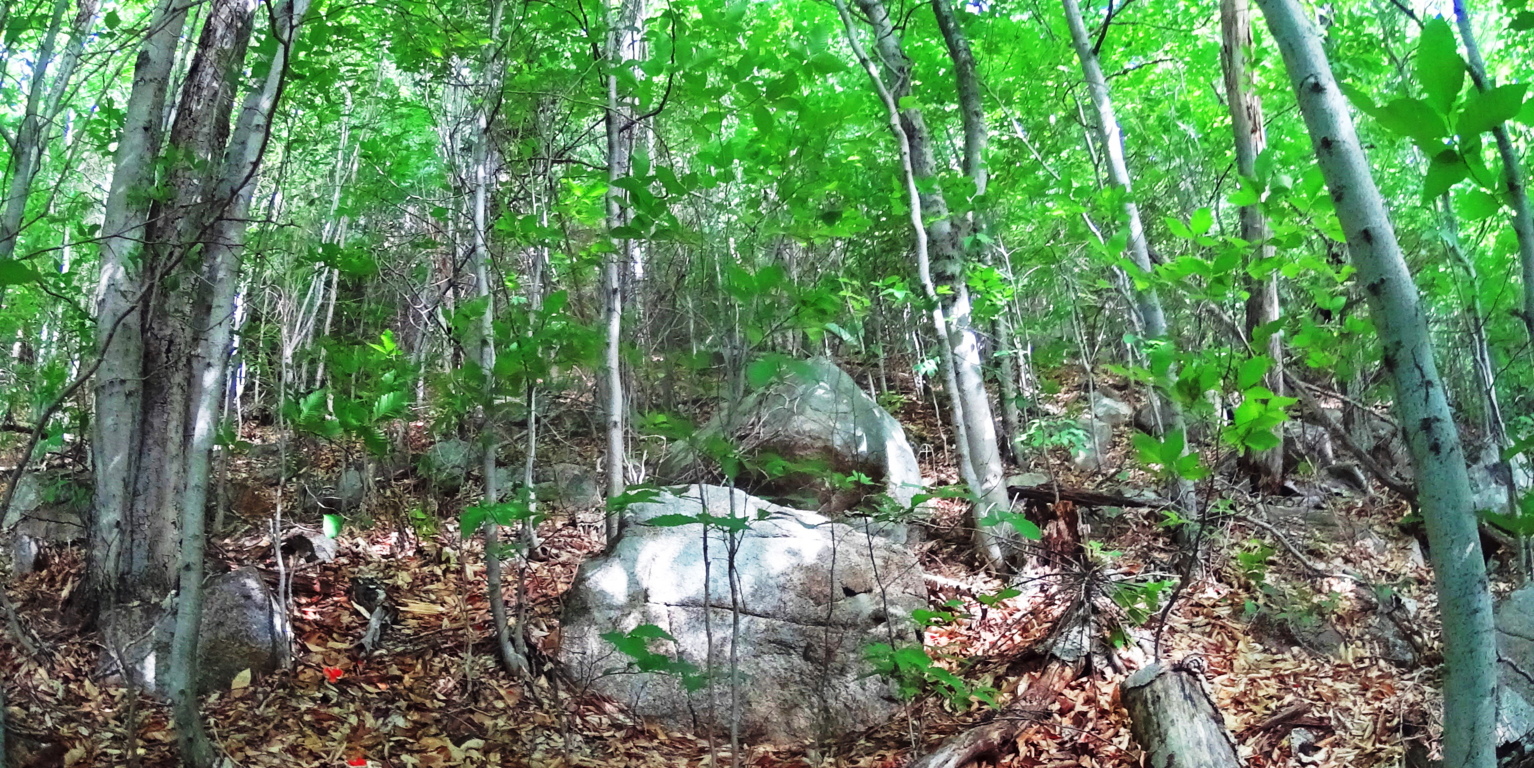 Like so many of the trails in New England, rocky staircases which are cut out of the mountain will begin to appear. At the base of many of these carved stairs there are triangular stones often marking the trail. It is a phenomenon that is found all throughout New England.
Like so many of the trails in New England, rocky staircases which are cut out of the mountain will begin to appear. At the base of many of these carved stairs there are triangular stones often marking the trail. It is a phenomenon that is found all throughout New England.
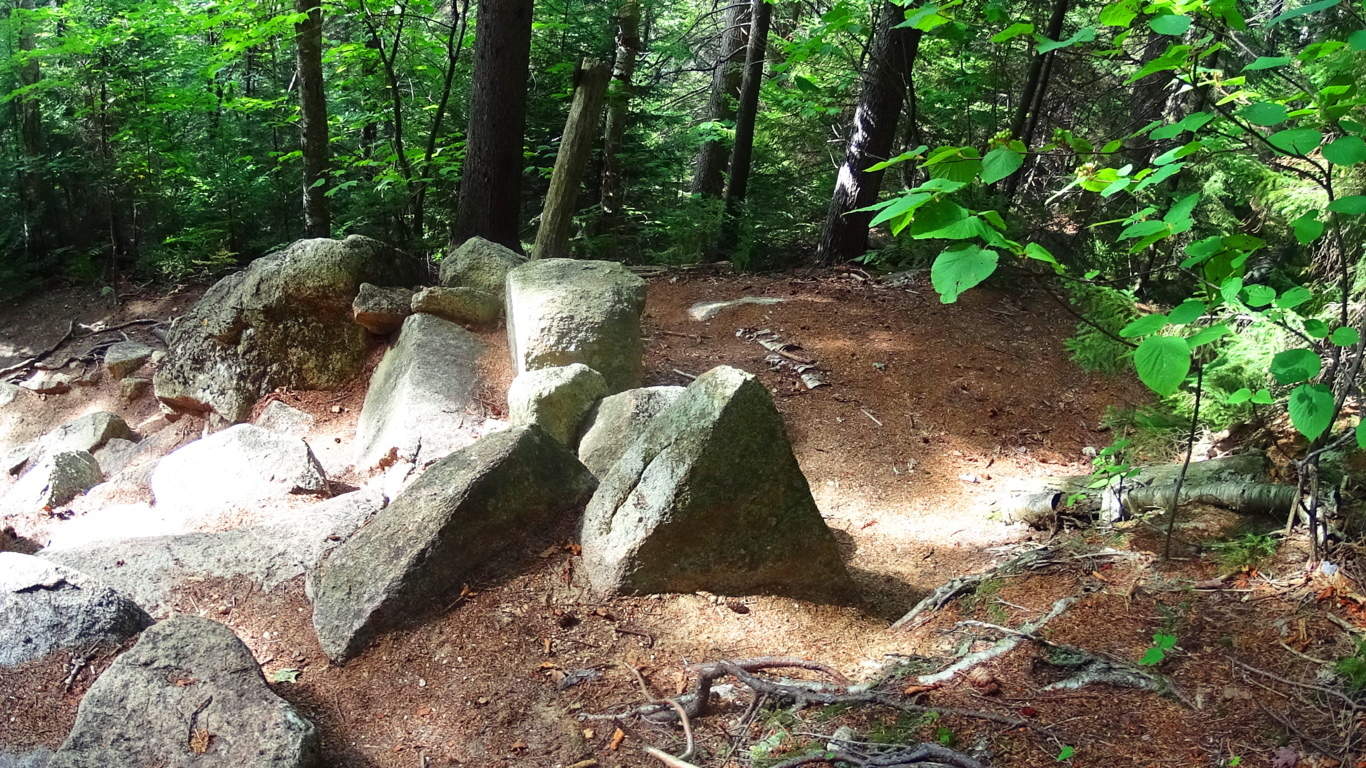 Here are three 8 foot tall equilateral-triangle megaliths at Five Ponds Loop Trail in Baxter State Forest in Maine, in the shadow of Mount Katahdin. It’s as if the overgrowth on the stones knows its not supposed to grow on these flat cut surfaces.
Here are three 8 foot tall equilateral-triangle megaliths at Five Ponds Loop Trail in Baxter State Forest in Maine, in the shadow of Mount Katahdin. It’s as if the overgrowth on the stones knows its not supposed to grow on these flat cut surfaces.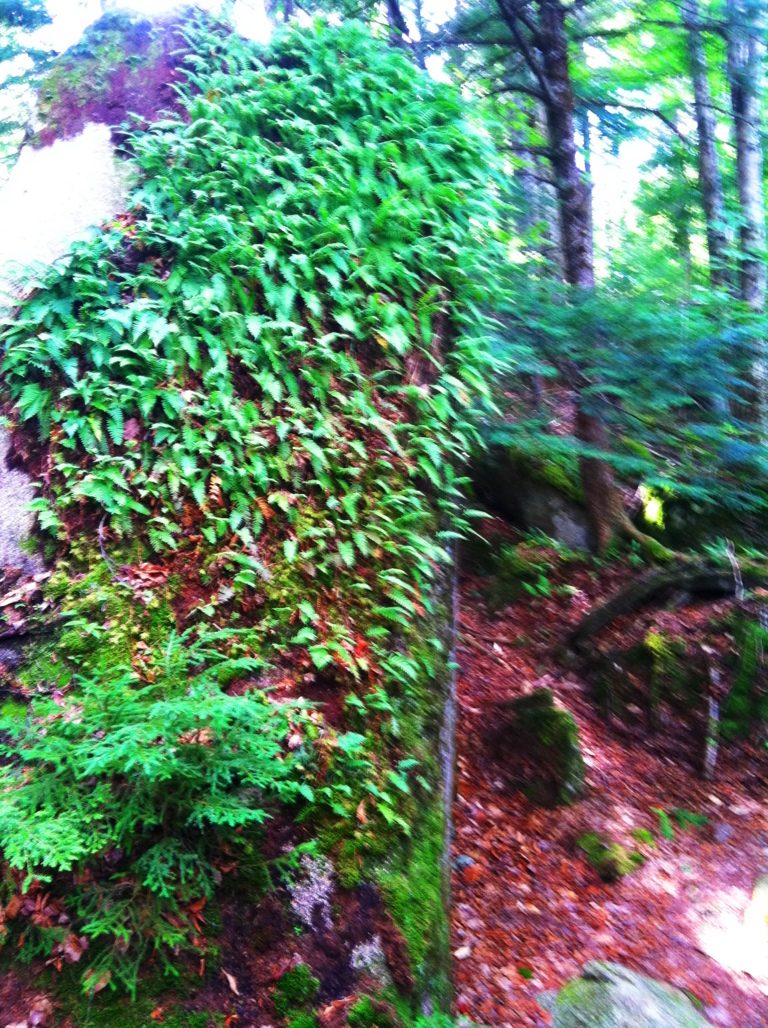 The front side of these stones are absolutely smooth, with a face cut like a knife through cake, while the back sides are arched and rounded. A profile view of the triangle stones is in the far left image. See how the hedge inundates the back, but the face is not touched? And these three stones are identical, lining the pathway like signs on a highway.
The front side of these stones are absolutely smooth, with a face cut like a knife through cake, while the back sides are arched and rounded. A profile view of the triangle stones is in the far left image. See how the hedge inundates the back, but the face is not touched? And these three stones are identical, lining the pathway like signs on a highway.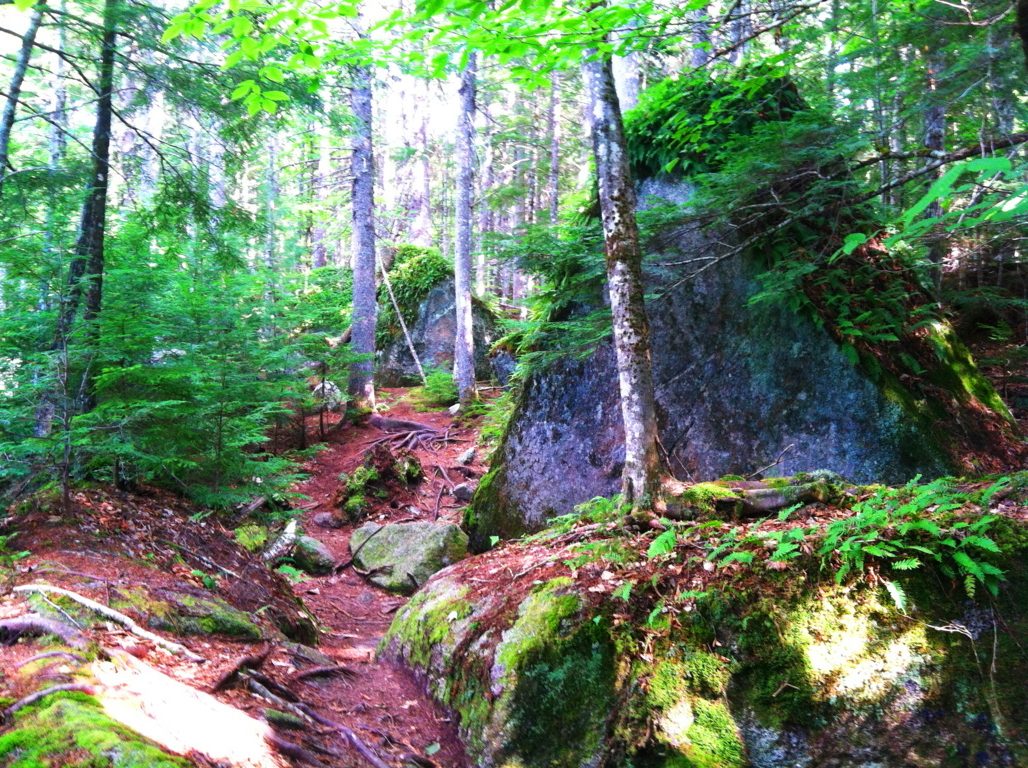 The chances of this are gastronomical. If I had not hiked almost every trail in Massachusetts and seen the triangular phenomenon for myself, I would have a hard time believing it, but time and time again it shows up, and is becoming impossible to deny.
The chances of this are gastronomical. If I had not hiked almost every trail in Massachusetts and seen the triangular phenomenon for myself, I would have a hard time believing it, but time and time again it shows up, and is becoming impossible to deny.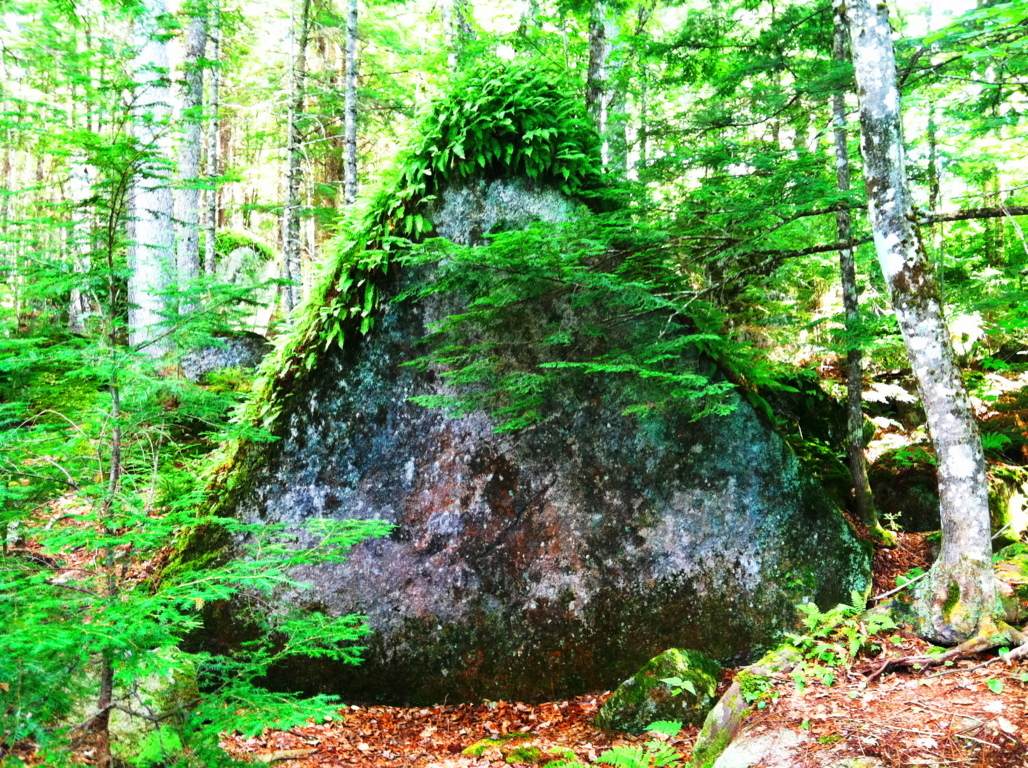 This “cut-face” style is very much like certain types of Celtic standing stones in Glenveagh National Park in Ireland, and Watatic Mountain in Massachusetts, which have stones with smoothly cut faces, supported by large rounded rears. Here is a look at one of the diamond shape “cut-face” stones at Glenveagh, with a profile view, and the frontal view (white stone below). I believe these are anthropological stones, cultural statements, not random. The meaning of the triangle requires more
This “cut-face” style is very much like certain types of Celtic standing stones in Glenveagh National Park in Ireland, and Watatic Mountain in Massachusetts, which have stones with smoothly cut faces, supported by large rounded rears. Here is a look at one of the diamond shape “cut-face” stones at Glenveagh, with a profile view, and the frontal view (white stone below). I believe these are anthropological stones, cultural statements, not random. The meaning of the triangle requires more
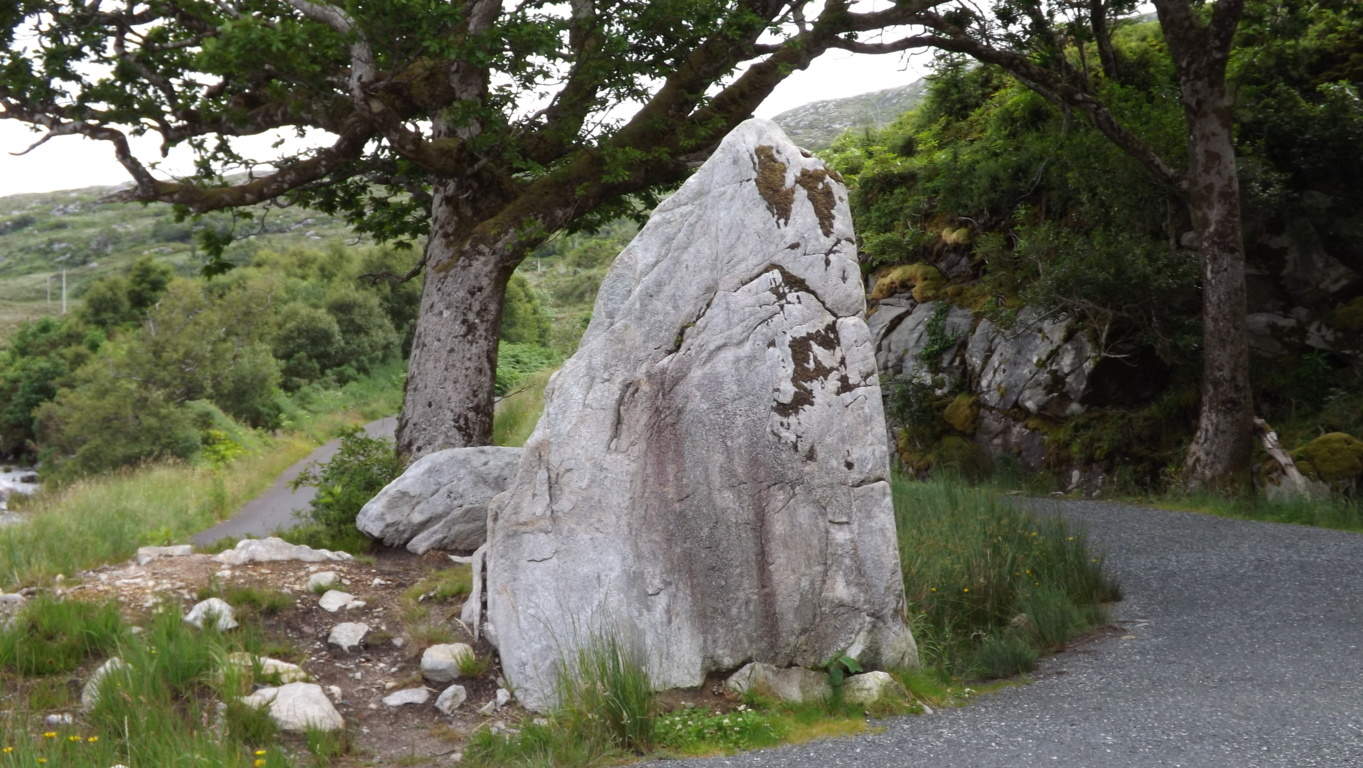
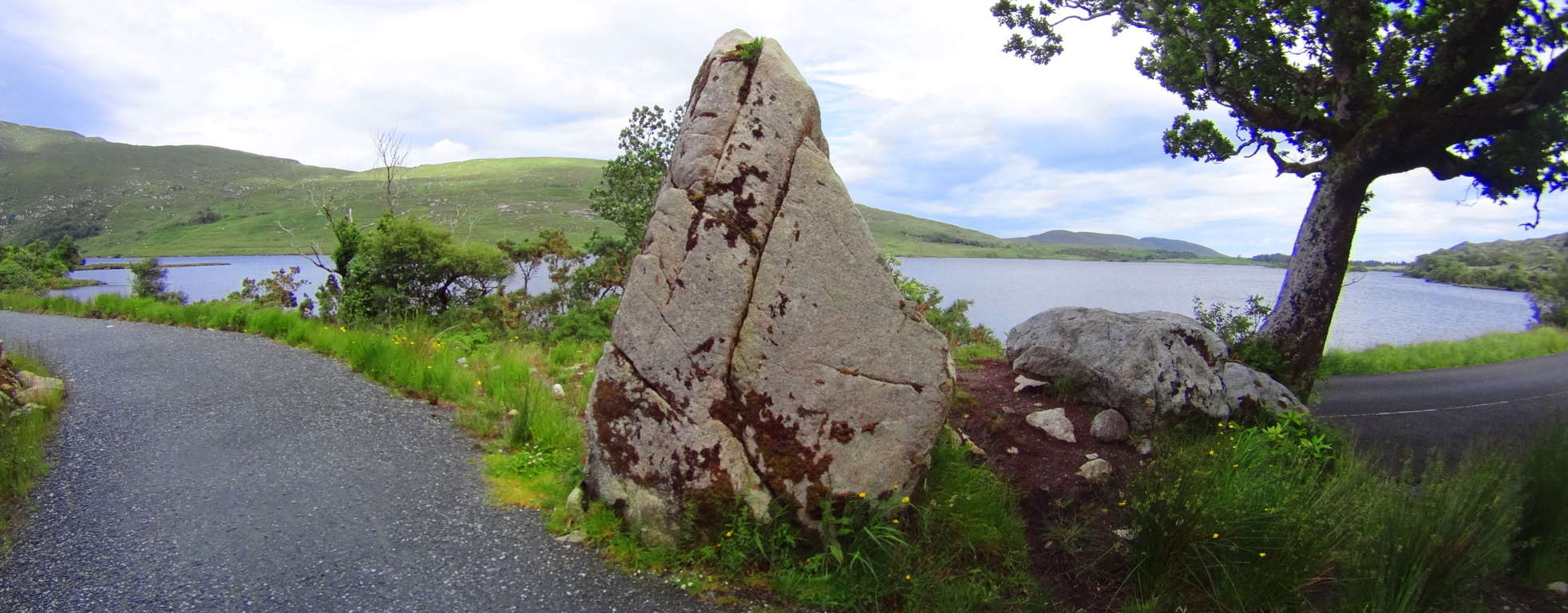
explanation, and will be explored in a separate post. Continuing on at Mount Chocorua, the small triangle will mark your first stone staircase. As you begin to climb, Chipmunks and Squirrels scatter in every direction, storing acorns under the warm stones.
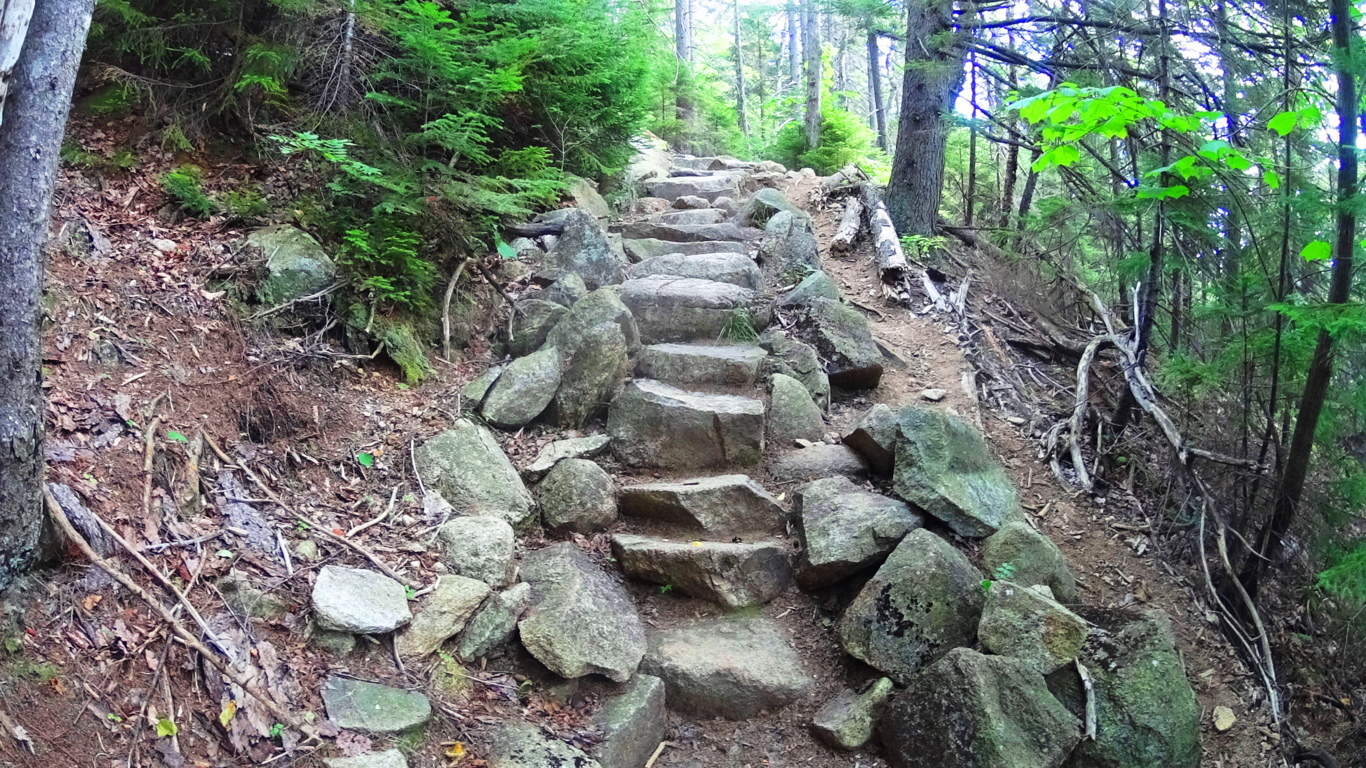
Ascending this stair you will begin to come across ‘signature cross sections’, or ‘X’s’, that also appear mysteriously at trails throughout New England. Here is a cross section along the trail at Chocorua on the left, and a cross section at Mount Watatic on the right.
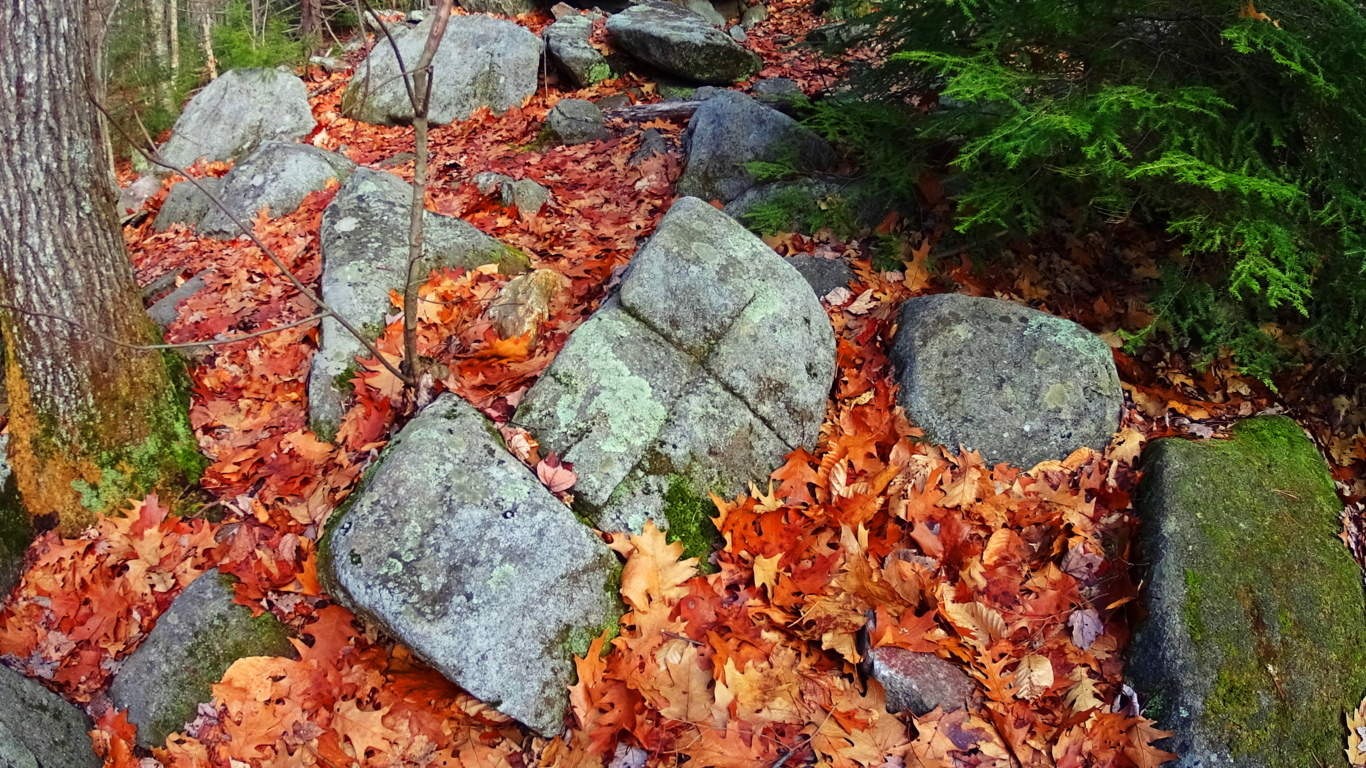
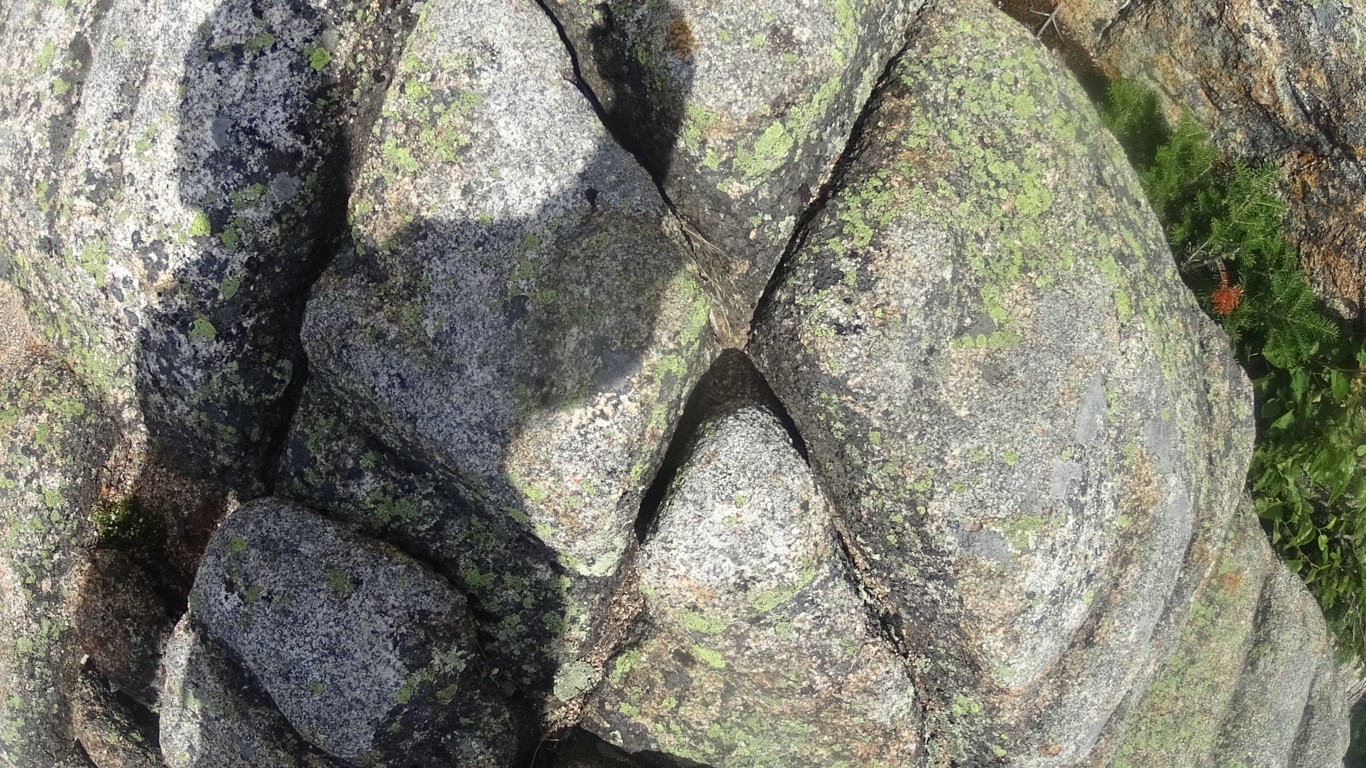
Further up “Piper Trail”, (as if this isn’t strange enough) is another ‘cross section’, but one-quarter portion of its total figure has been cut out, and moved several feet down the trail, like a giant puzzle piece. This is clearly a stylized craftsmanship, like fitted blocks.
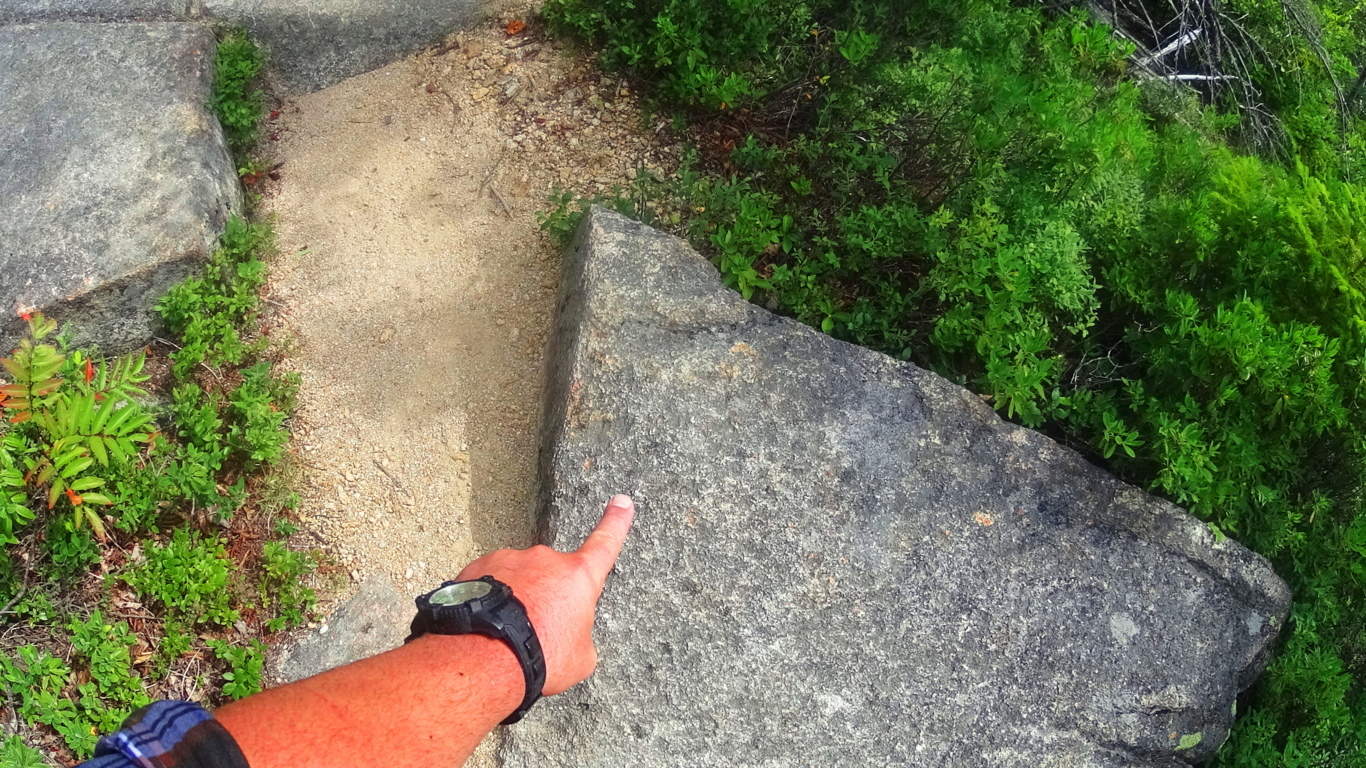
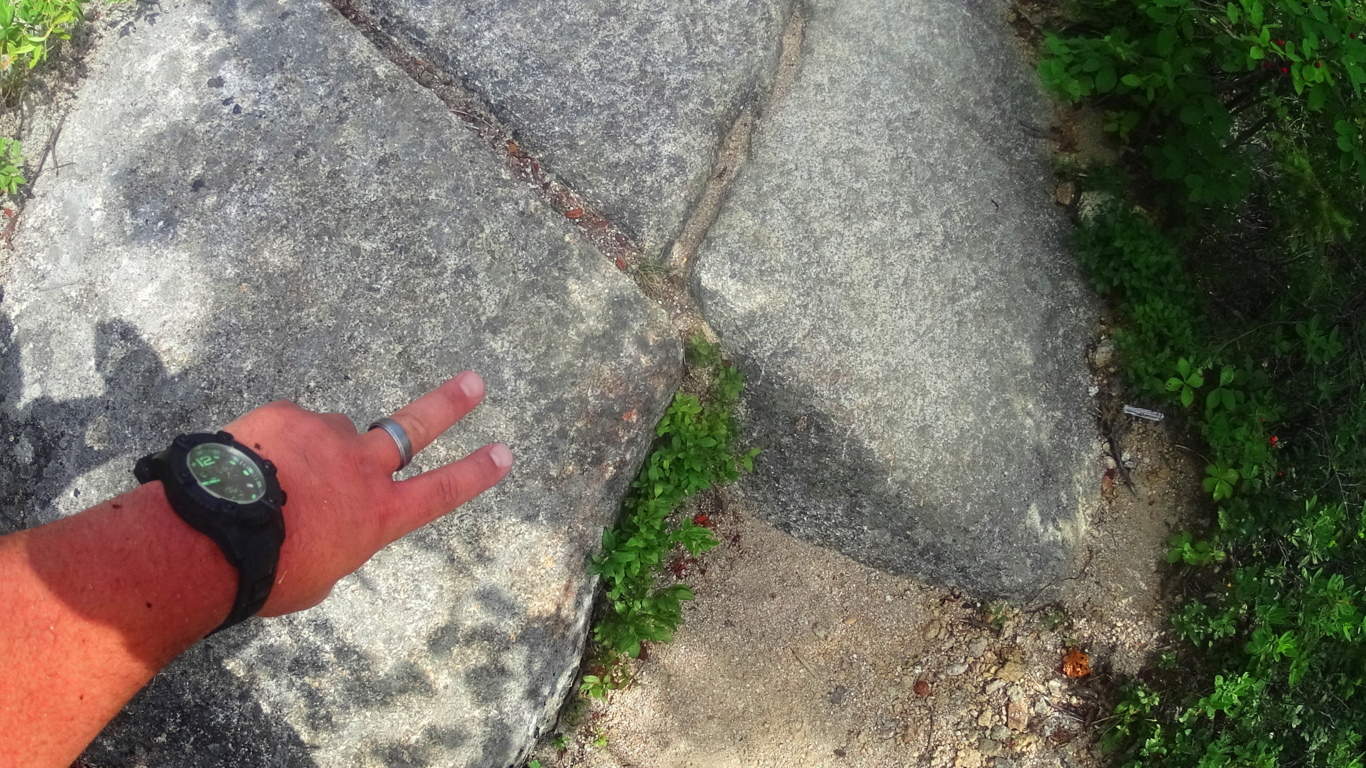
The stairway has many “signature” type stones, indicating that someone is leaving a stylized mark on this pathway. After several stairways you will come to the large boulder-porches that begin to break the treeline.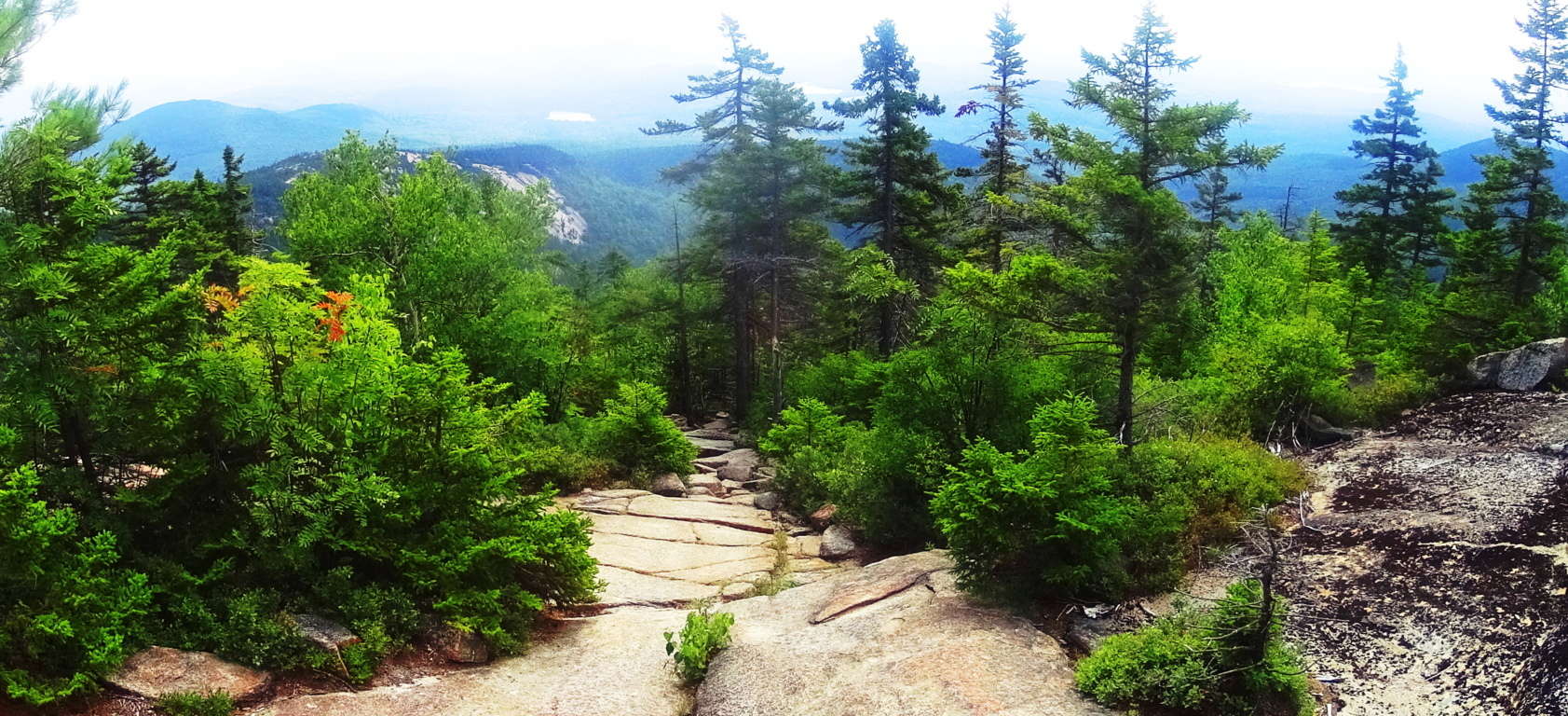 The mid-portion of this hike is a trek on boulder-porches and tight pathways. The view becomes beautiful, looking south into Massachusetts and the river-valley below. The ever rolling aspect of these mountains is more clearly revealed, with a slightly blue hue on the peaks that mingle with the sky in the peripheral distance.
The mid-portion of this hike is a trek on boulder-porches and tight pathways. The view becomes beautiful, looking south into Massachusetts and the river-valley below. The ever rolling aspect of these mountains is more clearly revealed, with a slightly blue hue on the peaks that mingle with the sky in the peripheral distance.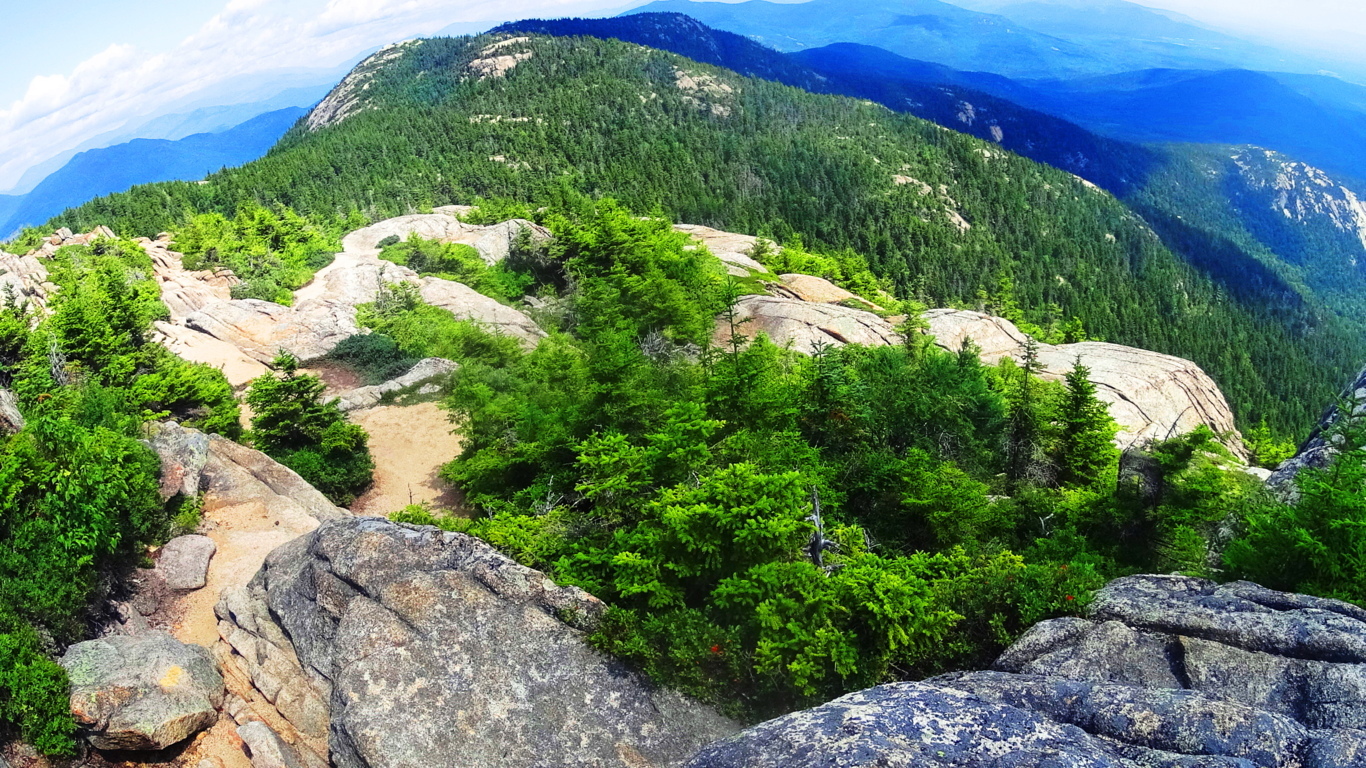 Turning your attention towards the peak, you will reach a ‘crossroad’ of choices in a glade just before the final ascent. There is a wooden sign that points to the pathway leading north, further into the forest, and an arrow pointing left, to the peak. As you follow the Peak Trail sign you will arrive at a stunning boulder-ledge that mingles with White Pines, running roughly 150 steep yards, straight to the peak.
Turning your attention towards the peak, you will reach a ‘crossroad’ of choices in a glade just before the final ascent. There is a wooden sign that points to the pathway leading north, further into the forest, and an arrow pointing left, to the peak. As you follow the Peak Trail sign you will arrive at a stunning boulder-ledge that mingles with White Pines, running roughly 150 steep yards, straight to the peak.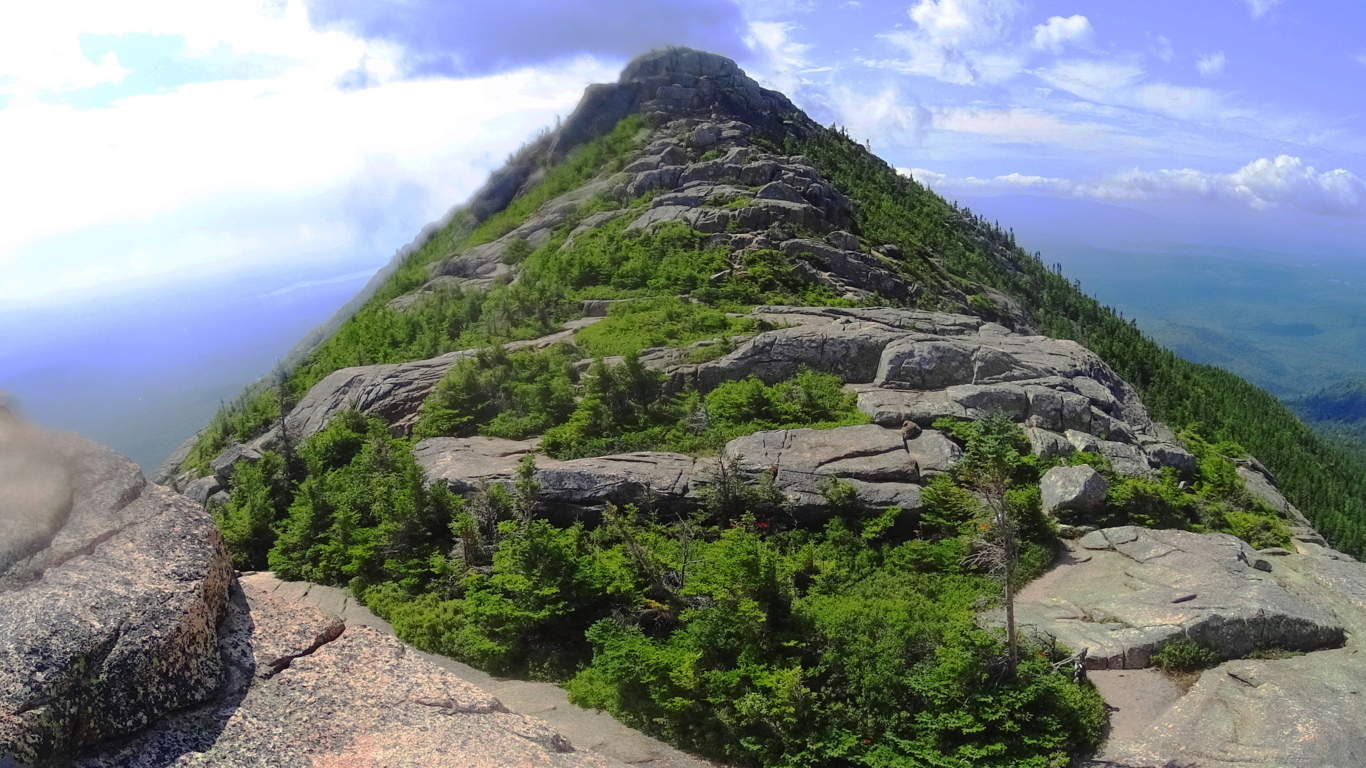 There is a singular massive boulder that is set in place in a distinctly different way from the others, with several incised lines around its sides sitting just before the final ledge. This may very well be a type of Dolmen. Continuing beyond this mysterious stone you will arrive at the top.
There is a singular massive boulder that is set in place in a distinctly different way from the others, with several incised lines around its sides sitting just before the final ledge. This may very well be a type of Dolmen. Continuing beyond this mysterious stone you will arrive at the top.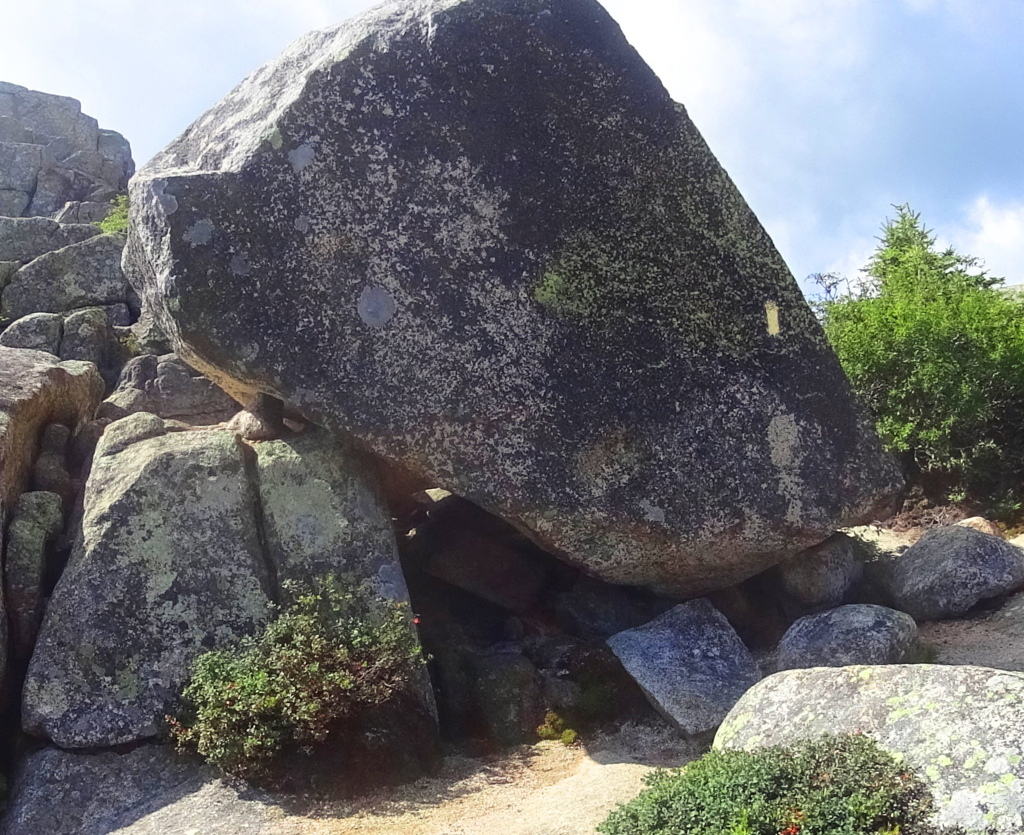 Take your time here, and enjoy the cool crosswind along with a spectacular view. White Mountain National Forest is unveiled.
Take your time here, and enjoy the cool crosswind along with a spectacular view. White Mountain National Forest is unveiled.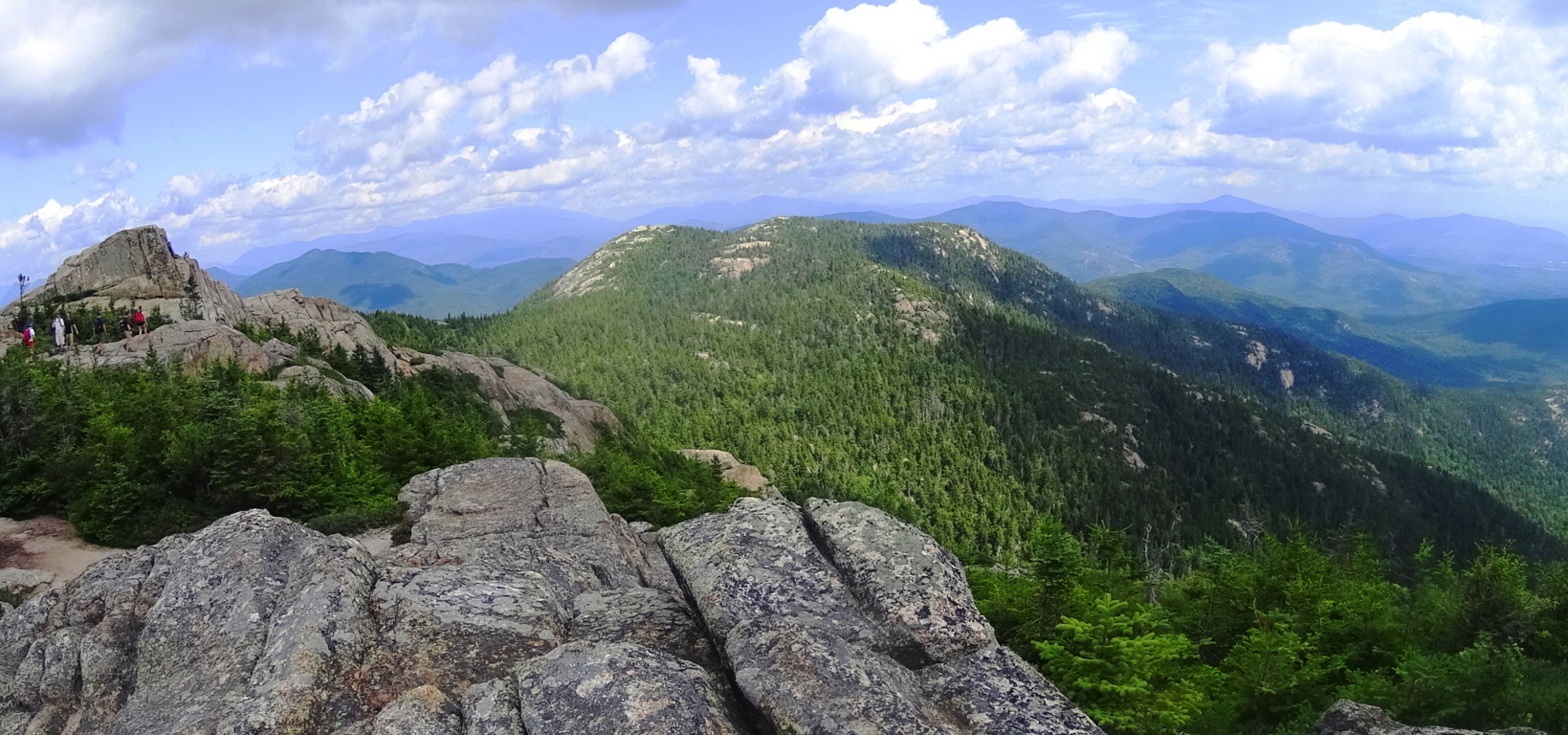 The peak of Chocorua is a 360 degree porch, and it is also a dragonfly haven! There is a standard official mountain-marker at the highest point if you wish to touch it, as many hikers do to complete their hike.
The peak of Chocorua is a 360 degree porch, and it is also a dragonfly haven! There is a standard official mountain-marker at the highest point if you wish to touch it, as many hikers do to complete their hike.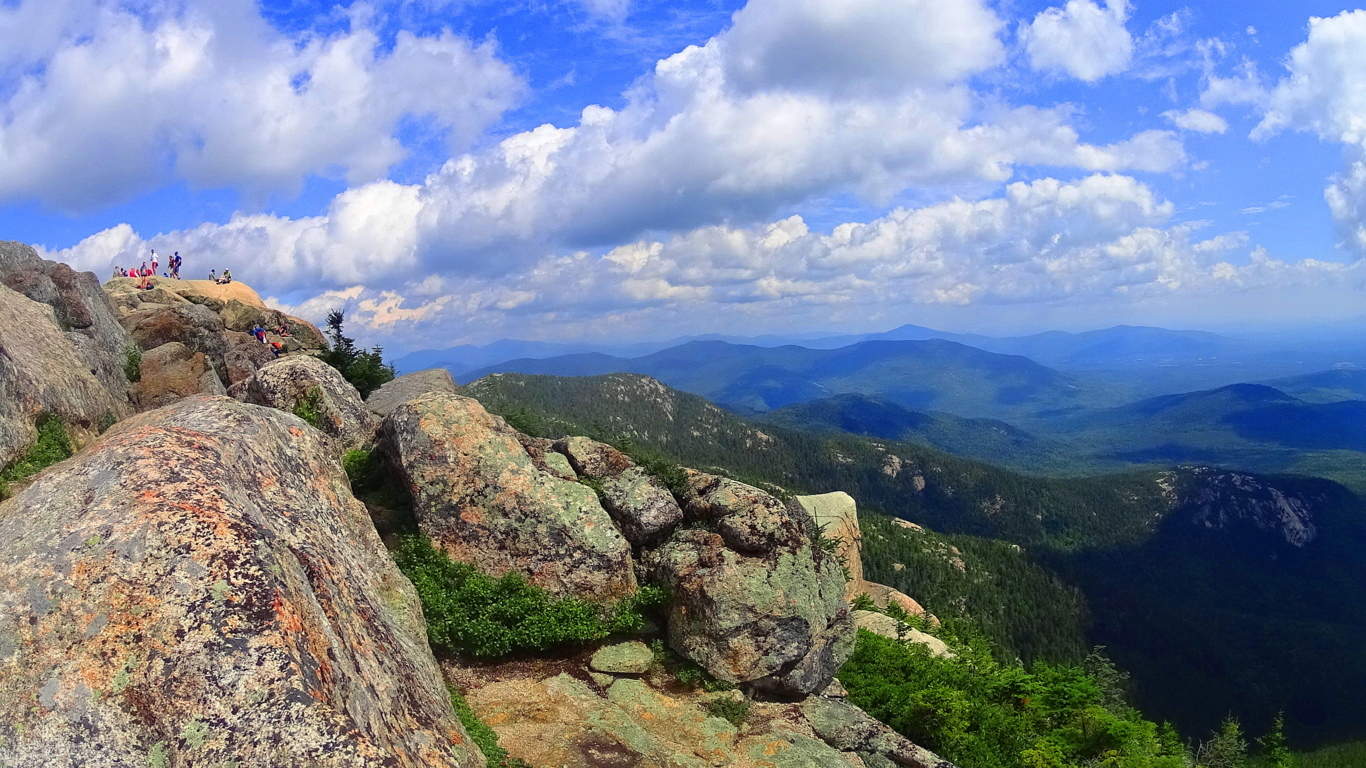 The clouds roll cumulus into the states beyond, and the sun is warm on the boulders of the peak at Mount Chocorua. Climbing this mountain is absolutely a significant accomplishment. I have found many Celtic mountains to be less challenging than this White Mountain gem. New Hampshire is a wonderful place, with a vast natural habitat well worth exploring. It is comparable to places like The Mourn Mountain Range in Ireland, and The Glenveagh Mountains in north Ireland. If you give the White Mountains a chance you could very well fall in love with the classic New Hampshire countryside. Find your way, and go strong.
The clouds roll cumulus into the states beyond, and the sun is warm on the boulders of the peak at Mount Chocorua. Climbing this mountain is absolutely a significant accomplishment. I have found many Celtic mountains to be less challenging than this White Mountain gem. New Hampshire is a wonderful place, with a vast natural habitat well worth exploring. It is comparable to places like The Mourn Mountain Range in Ireland, and The Glenveagh Mountains in north Ireland. If you give the White Mountains a chance you could very well fall in love with the classic New Hampshire countryside. Find your way, and go strong.
Sculptured Rocks Reserve/Groton, New Hampshire/U.S.A
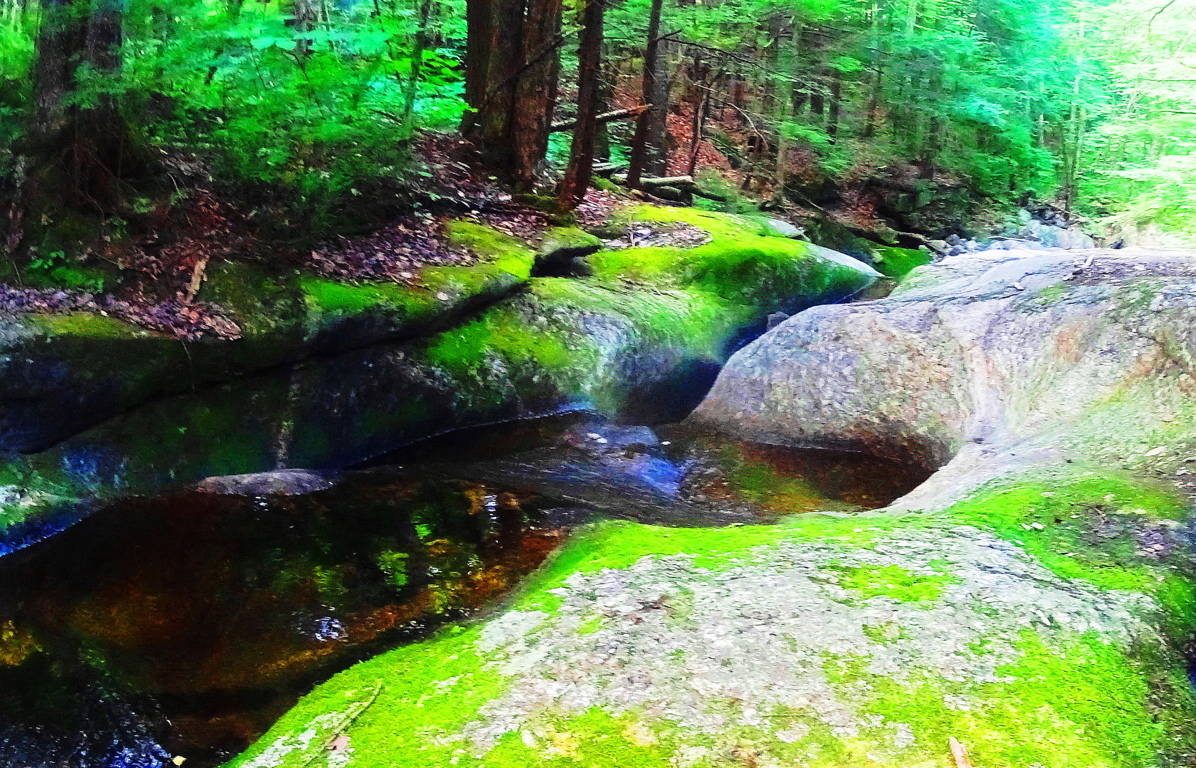 Location: Cockermouth River, Groton New Hampshire
Location: Cockermouth River, Groton New Hampshire
Note: Sculptured Rock Natural Reserve is a watery wonderland of falls rushing within the forests and small mountains of Groton New Hampshire. A hiker has the option of following the falls as far as they wish by hopping from stone to stone, or perhaps stopping to splash around in the amazing still pools created by the rocks.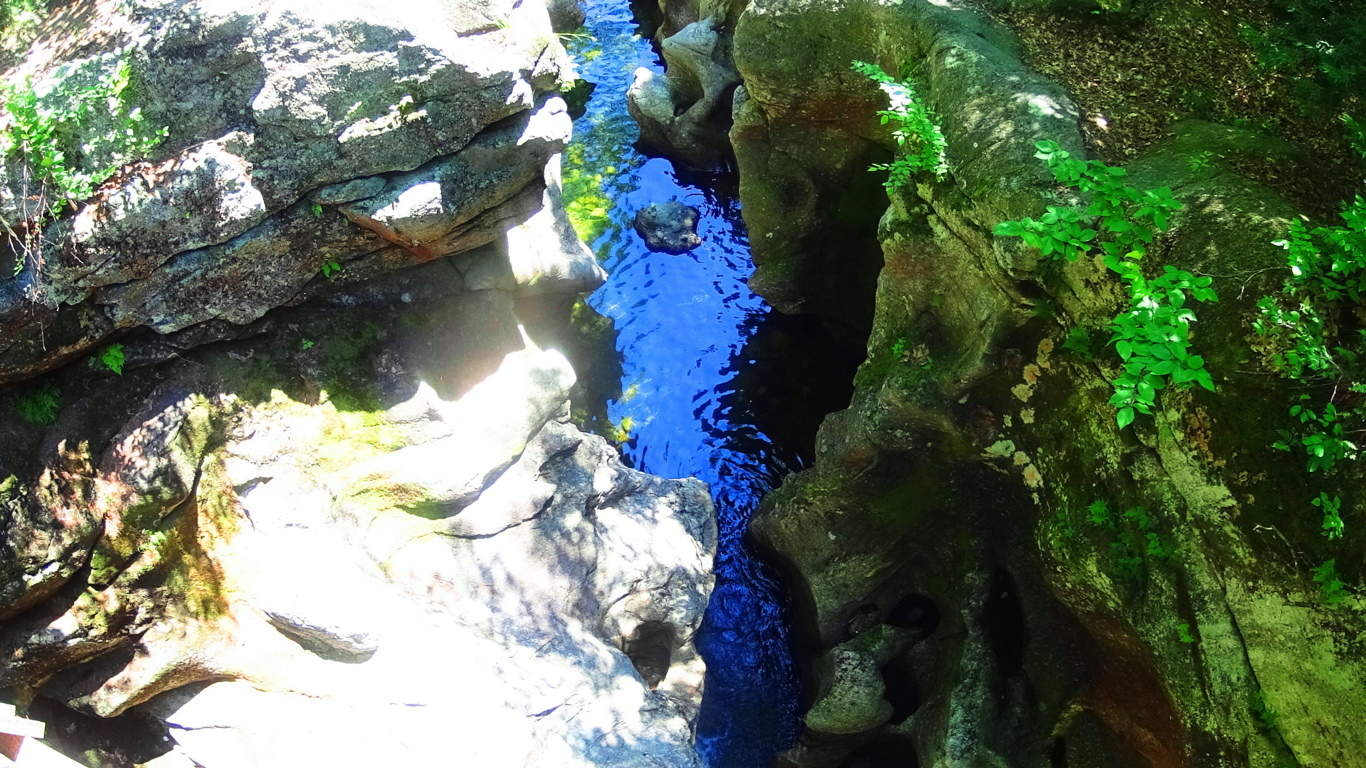 Trails also run away from the fall into the forest, where other works of ancient stone and crafting can be found, such as Cairns, and ‘directional stones’ from another epoch. The area is a notable anthropological site, with an authentic ancient stone dwelling nestled close to the designated forest trail, and several massive stone enclosures of megalithic scale further down the fall to the south.
Trails also run away from the fall into the forest, where other works of ancient stone and crafting can be found, such as Cairns, and ‘directional stones’ from another epoch. The area is a notable anthropological site, with an authentic ancient stone dwelling nestled close to the designated forest trail, and several massive stone enclosures of megalithic scale further down the fall to the south. 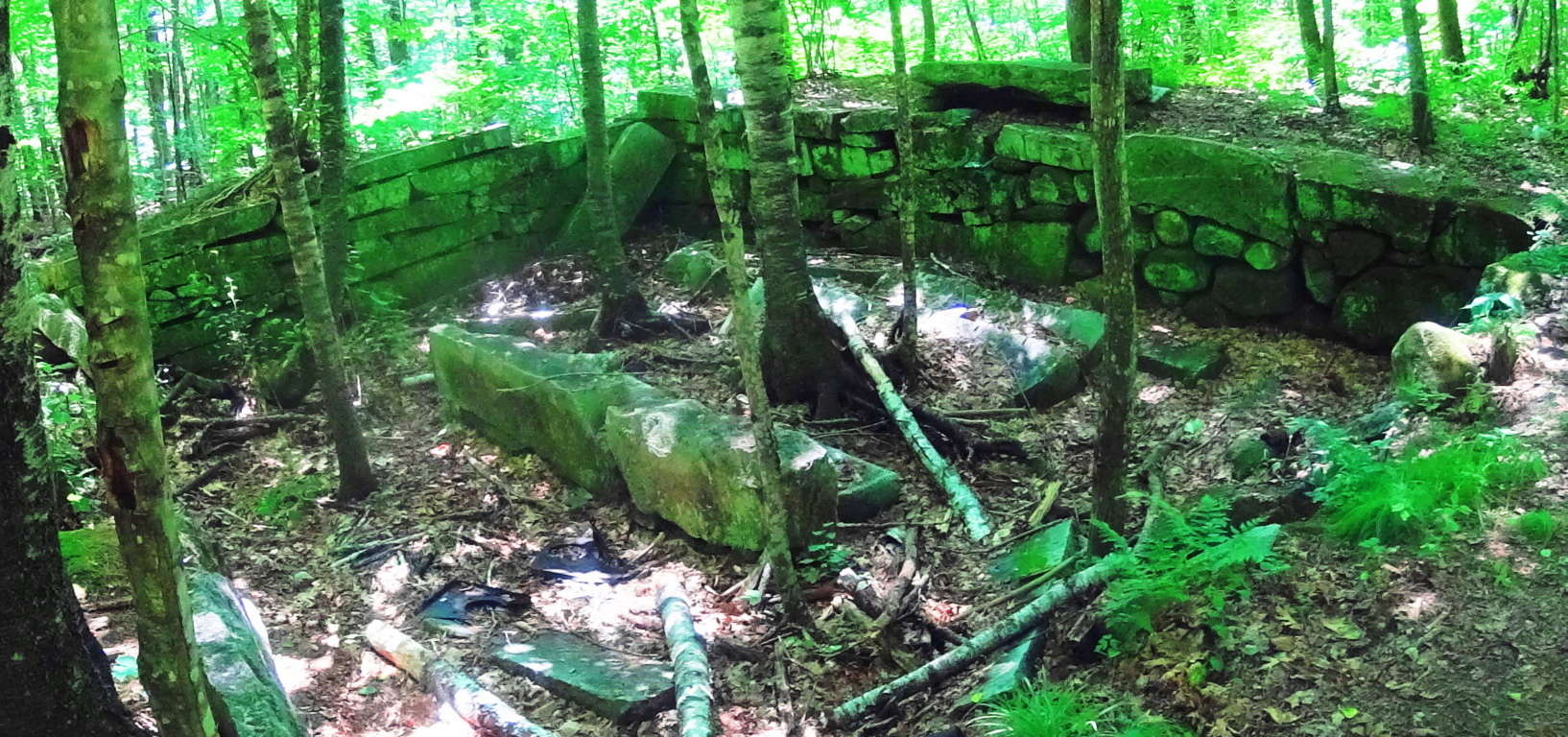 I believe these works, due to their scale and placement, to be PRE Native American, built by a culture yet to be acknowledged by current anthropological historians.
I believe these works, due to their scale and placement, to be PRE Native American, built by a culture yet to be acknowledged by current anthropological historians.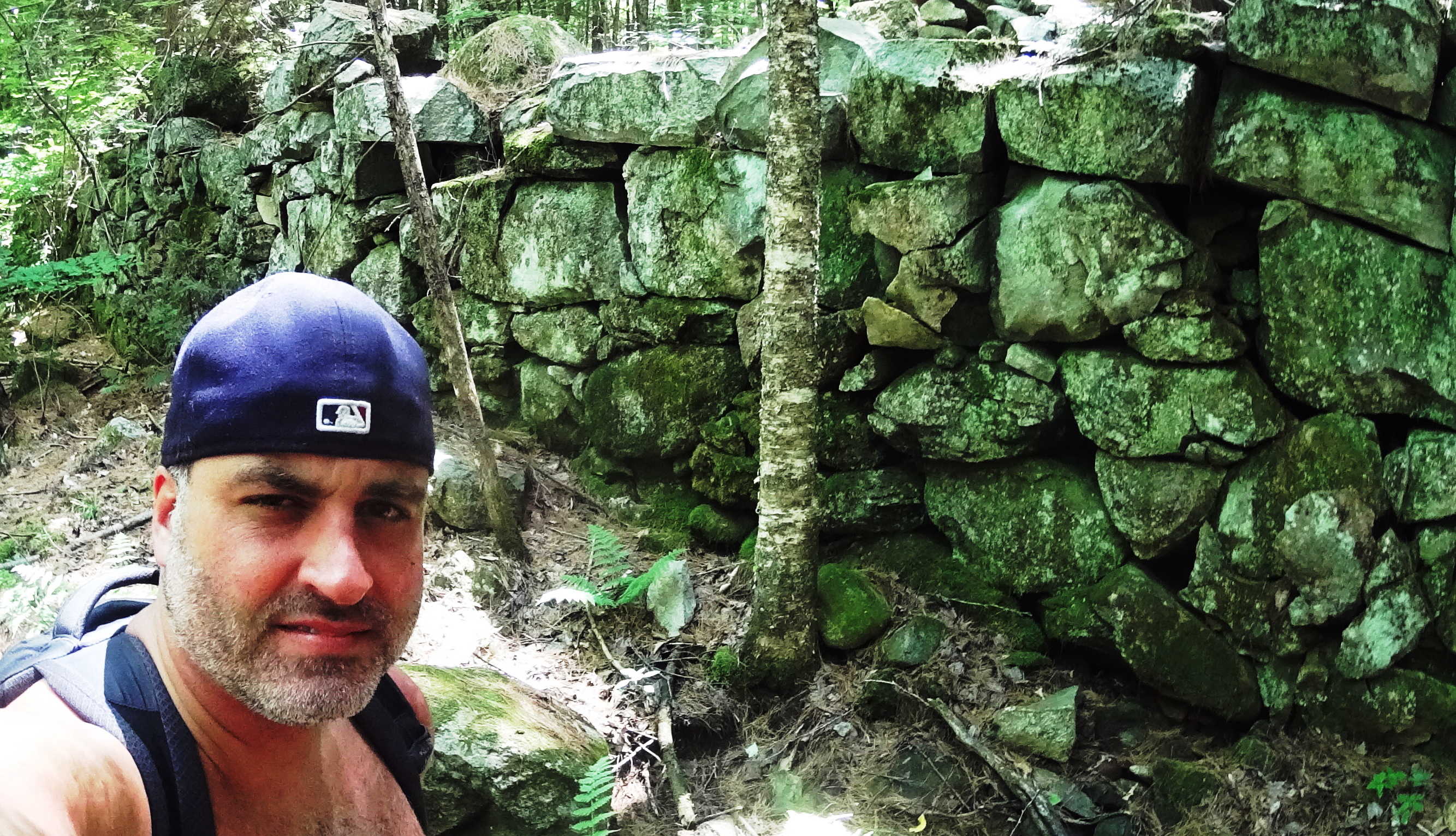 The main water artery, the Cockermouth River, is filled with free standing boulders that sit in an incredibly smooth stone tunnel of what looks to be sculpted rocks. This is very similar to the style of many free standing boulders in Northern Ireland’s rivers, but on a much larger scale. There are literally thousands of these free standing boulders. Away from the Cockermouth River, further north, are several wild rivers without trails running up small mountains enclosing the area.
The main water artery, the Cockermouth River, is filled with free standing boulders that sit in an incredibly smooth stone tunnel of what looks to be sculpted rocks. This is very similar to the style of many free standing boulders in Northern Ireland’s rivers, but on a much larger scale. There are literally thousands of these free standing boulders. Away from the Cockermouth River, further north, are several wild rivers without trails running up small mountains enclosing the area.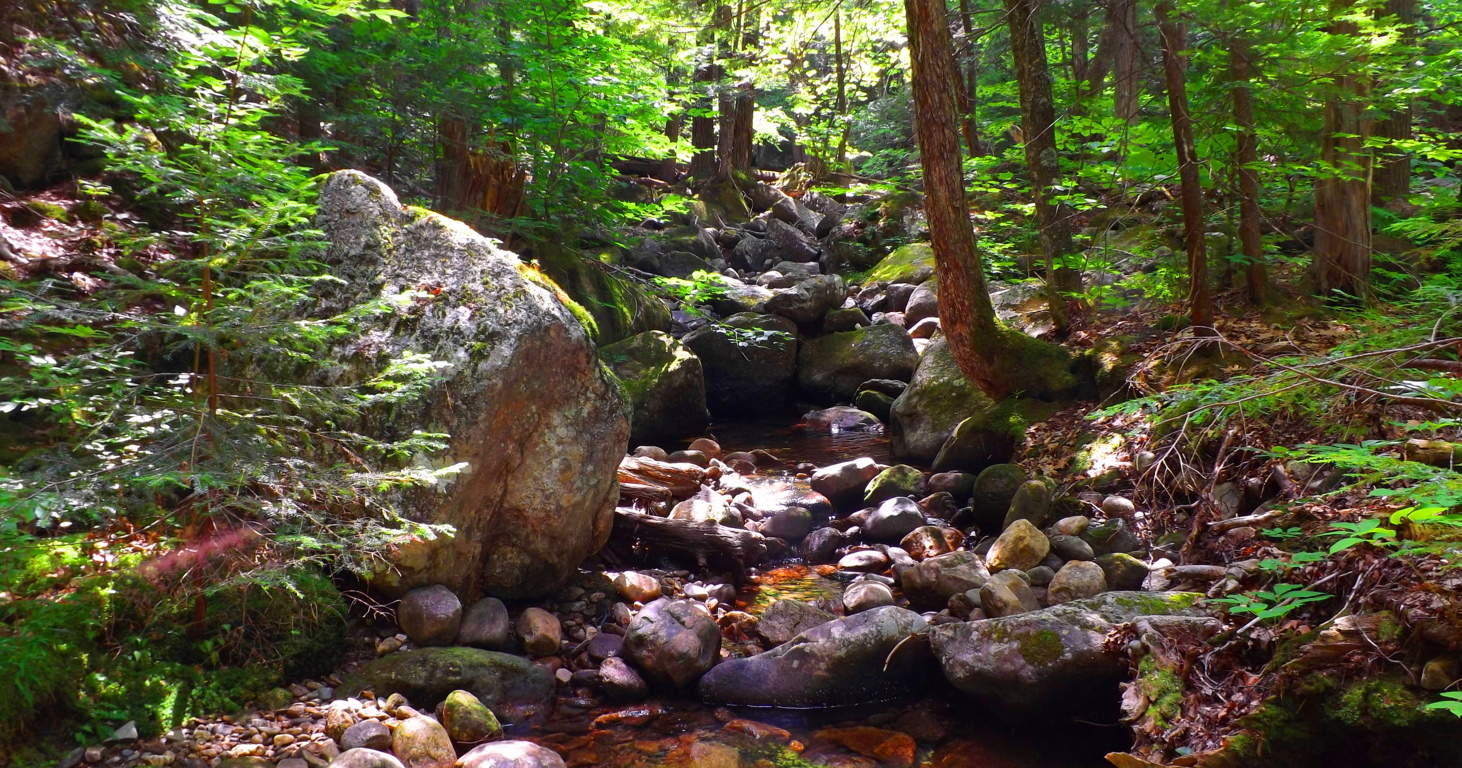 For an experienced and prepared hiker, I recommend the very real adventure of following a waterfall up the mountain by stepping on its stones. Following small mountain falls is an amazing experience due to the fact that the features of the fall become increasingly impressive the higher up you go. Wide stone porches and steps that look to be carved right out of the mountain support fully flowing falls that dance down the stones. Somehow these features leave plenty of dry space along the way, allowing for great footing beside stone porches and pools while ascending the fall.
For an experienced and prepared hiker, I recommend the very real adventure of following a waterfall up the mountain by stepping on its stones. Following small mountain falls is an amazing experience due to the fact that the features of the fall become increasingly impressive the higher up you go. Wide stone porches and steps that look to be carved right out of the mountain support fully flowing falls that dance down the stones. Somehow these features leave plenty of dry space along the way, allowing for great footing beside stone porches and pools while ascending the fall.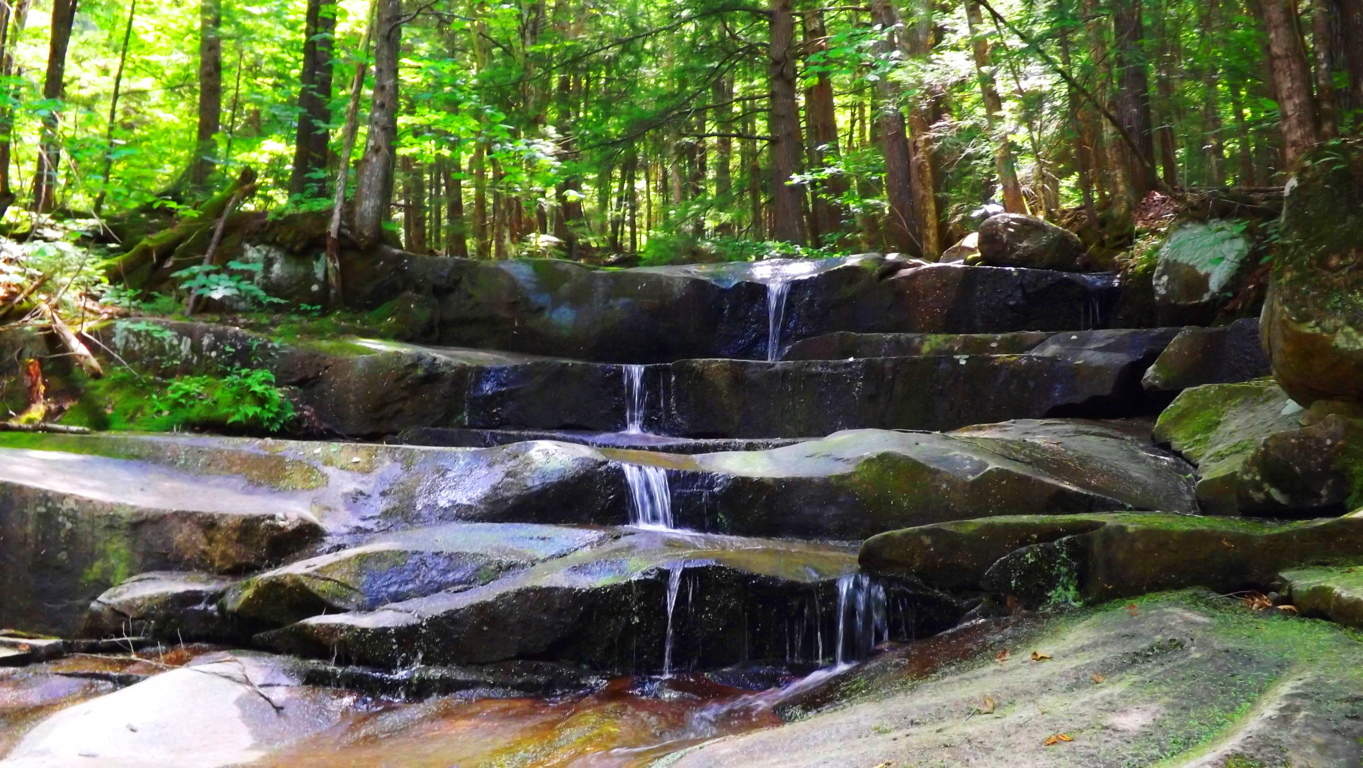 One of the best parts of following a wild fall in New Hampshire is the option to jump in, or plop down in the middle of water-slide like tube of water-flow, and cool down along the way.
One of the best parts of following a wild fall in New Hampshire is the option to jump in, or plop down in the middle of water-slide like tube of water-flow, and cool down along the way. 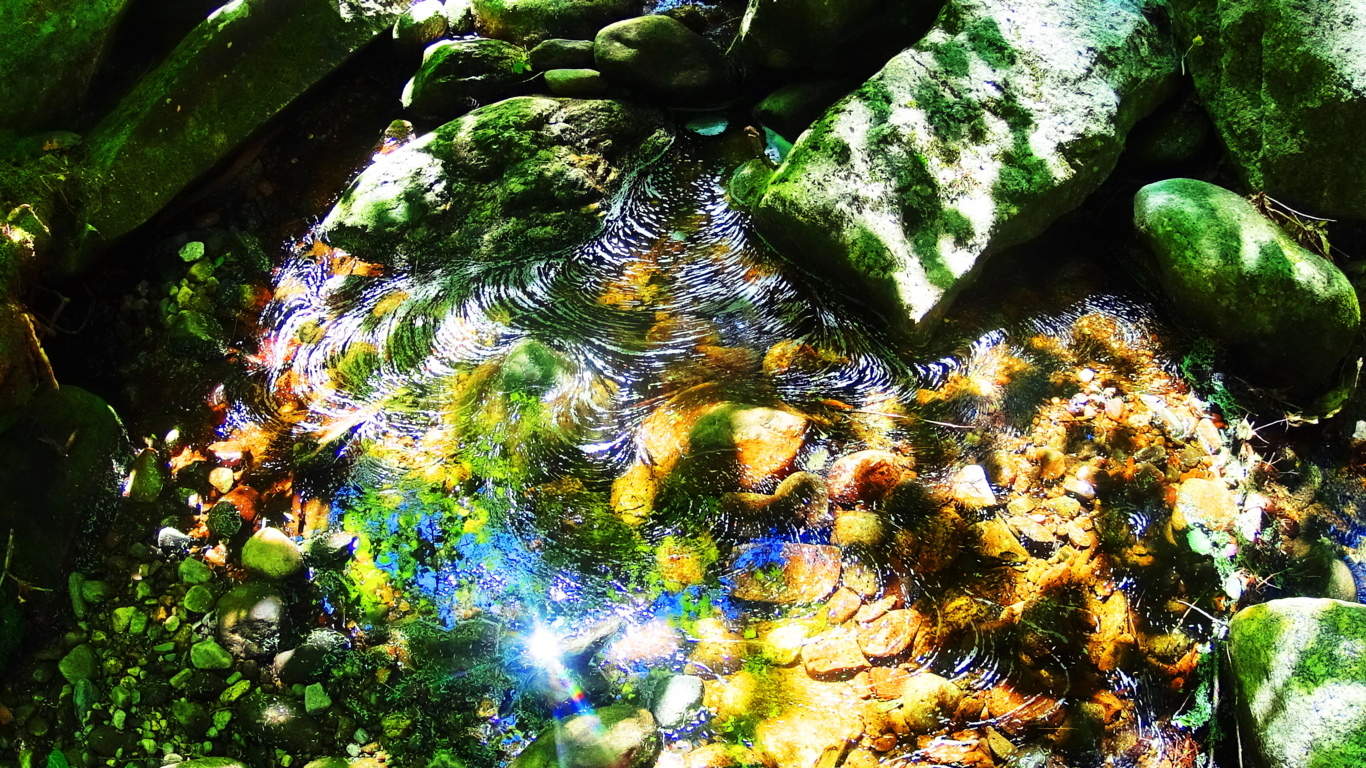 The beautiful combination of sculpted waterways, dynamic waterfalls, ancient forestry/ stonework, literally from the beginning of time, make Sculptured Rock Reserve one of the best kept secrets for outdoor enthusiasts. It is one part water-filled canyon, another part Celtic rock haven, with waterfalls that truly spark the imagination. Sculptured Rock has a sacred feel. Seek it out.
The beautiful combination of sculpted waterways, dynamic waterfalls, ancient forestry/ stonework, literally from the beginning of time, make Sculptured Rock Reserve one of the best kept secrets for outdoor enthusiasts. It is one part water-filled canyon, another part Celtic rock haven, with waterfalls that truly spark the imagination. Sculptured Rock has a sacred feel. Seek it out.
